Numero 3 | Primavera 2024 | Edizione italiana
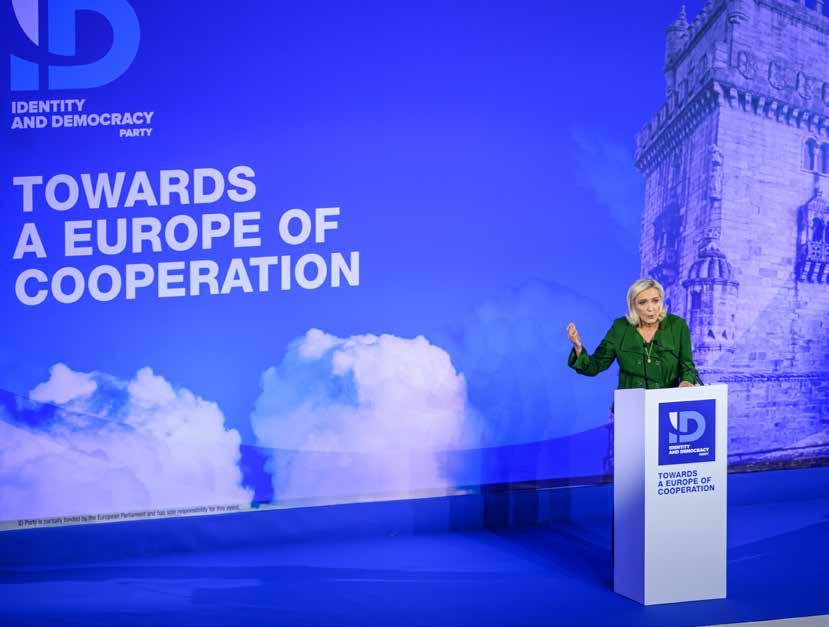
I NOSTRI LEADER
DESCRIVONO LA LORO VISIONE DELL’EUROPA
SONO SEMPRE PIÙ NUMEROSI I PATRIOTI IN TUTTA EUROPA
RENDICONTO DI CINQUE ANNI AL VOSTRO SERVIZIO

Numero 3 | Primavera 2024 | Edizione italiana

I NOSTRI LEADER
DESCRIVONO LA LORO VISIONE DELL’EUROPA
SONO SEMPRE PIÙ NUMEROSI I PATRIOTI IN TUTTA EUROPA
RENDICONTO DI CINQUE ANNI AL VOSTRO SERVIZIO
History is on our side
Throughout Europe, people have taken to the streets in recent years.
People took to the streets in yellow vests against rising taxes and a rising cost of living.
People took to the streets when their freedom was taken away during the Covid period.
People took to the streets in tractors, because farming and providing people with food is made virtually impossible.
Health workers took to the streets, police unions took to the streets, pensioners took to the streets.
Meanwhile, the EU elite continues. Plans regarding a Green Deal, EU taxes, a common health policy or a migration pact are further rolled out with the steam-roller.
The EU elite believes that the protest is ‘on the wrong side of history’. The people are not heard.
However, we, parties that want a different and better Europe, do hear these people and, above all, we listen to them. We stood with them on the streets and also speak on their behalf in parliaments.
This steam-roller must be stopped and the tanker turned. We firmly
La storia è dalla nostra parte
Ovunque, in Europa, la gente è scesa in strada in questi ultimi anni.
La gente è scesa in strada indossando i gilet gialli, contro l’aumento delle tasse e l’aumento del costo della vita.
La gente è scesa in strada, perché è stata privata della libertà durante il periodo del Covid.
La gente è scesa in strada con i trattori, perché è diventato impossibile condurre un’azienda agricola e nutrire la popolazione.
Il personale attivo nel settore della sanità è sceso in strada, i sindacati della polizia sono scesi in strada, i pensionati sono scesi in strada.
In tutto questo, l’élite europea mantiene il suo approccio ostinato. I progetti sul Green Deal, sulle tasse europee, sulla politica sanitaria comune o sul Patto migratorio vengono messi in atto come un rullo compressore. L’élite europea ritiene che la protesta si collochi “sul lato sbagliato della storia”. Il popolo non è ascoltato.
Tuttavia, noi, i partiti che vogliono un’Europa diversa e migliore, siamo all’ascolto della gente e soprattutto ascoltiamo il suo messaggio. La ascoltiamo in strada e parliamo in suo nome di fronte ai Parlamenti. Bisogna fermare questo rullo compressore e far fare marcia indietro all’autocisterna. Crediamo fermamente nel nostro progetto comune e
believe in our common project and will persevere, despite obstruction, despite lying media reports, despite transparent attempts to pit us against each other.
I consider myself fortunate that the partners of our European party Identity & Democracy have persevered together and are today in a better position than ever before. We have welcomed new members. It looks like our political family will grow even more, not only because our parties will emerge as great victors, but also because we will welcome new partners from new Member States.
We will make history in June, because history is on our side!
Gerolf Annemans Chairman
Identityand Democracy Party
lo porteremo avanti con tenacia, nonostante le ostruzioni, nonostante le informazioni menzognere dei media, nonostante i tentativi evidenti di far credere che siamo gli uni contro gli altri.
Mi ritengo fortunato, perché i partner del nostro partito europeo Identità e Democrazia hanno continuato a lavorare insieme e oggi occupano la miglior posizione di sempre. Abbiamo accolto nuovi membri. Sembra che la nostra famiglia politica crescerà ancora, non solo perché i nostri partiti ne usciranno grandi vincitori, ma anche perché accoglieremo nuovi partner provenienti dai nuovi Stati membri.
A giugno entreremo nella storia, perché la storia è dalla nostra parte!
Gerolf Annemans presidente del Partito Identità e Democrazia
 Gerolf Annemans, presidente del
Gerolf Annemans, presidente del

Rendiconto di cinque anni di fuga degli europeisti dalle loro responsabilità
Report 1 - Institutions : Looking back at the relentless five-year headlong rush of the Europeanists
Questione 2 - Immigrazione Le conseguenze di un’immigrazione ormai fuori controllo
Report 2 - Immigration : From Lampedusa to our villages, the consequences of immigration gone mad
58 Questione 3 - Green Deal: il verde ha sostituito il rosso
Report 3 - Green Deal : green has superseded red



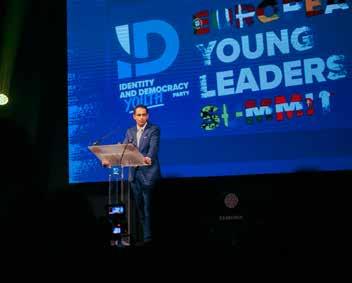
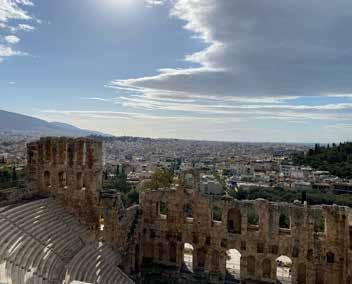
PATRIE E PARTITI / COUNTRIES AND PARTIES
92 I patrioti prendono le redini, in tutta Europa
Patriots are taking the reins of power across Europe
Geert Wilders, la forza della costanza
Geert Wilders, the importance of being determined
PROSPETTIVA / FOCUS

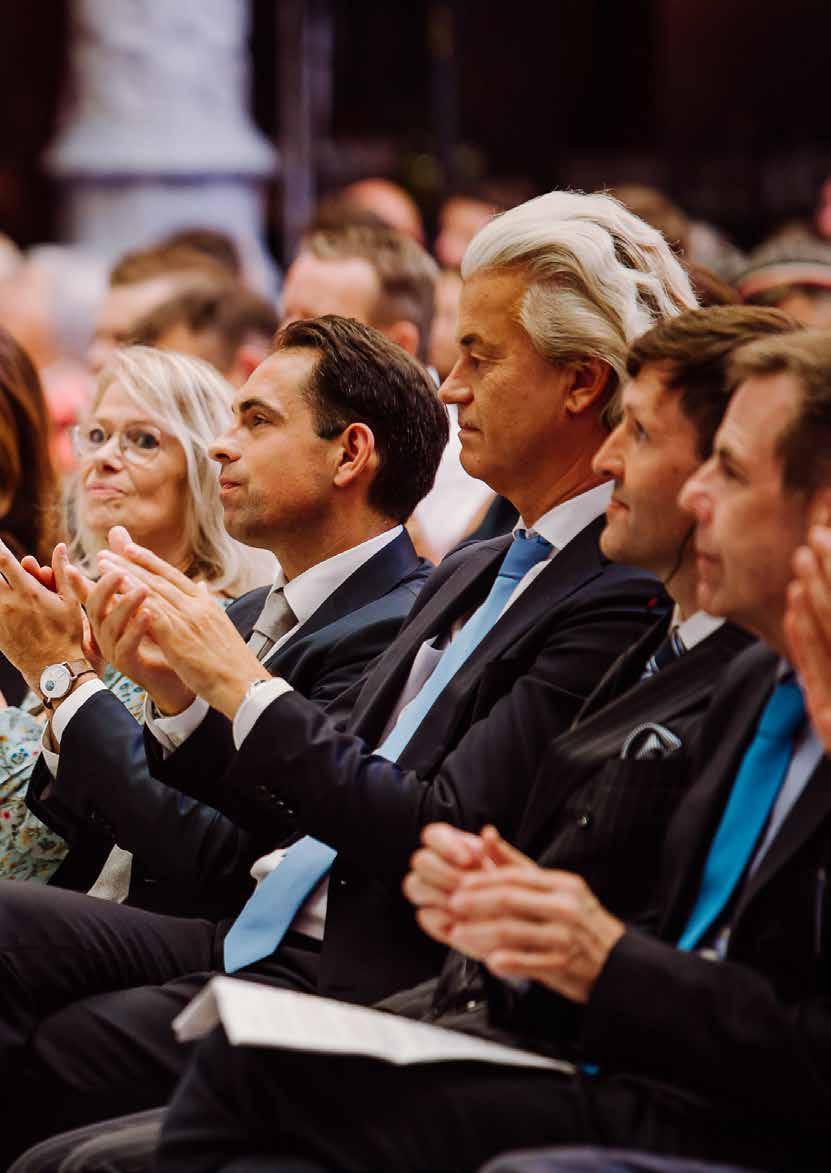
From June 6 to 9, two opposing visions of Europe will clash
From June 6 to 9, the citizens of the 27 Member States of the European Union will be heading to the polls to elect the 720 members who will take their seats in Strasbourg.
This will give rise to two opposing visions of Europe: that of the Europeanists, constantly seeking to ensure greater federalism and ever less sovereignty for the Nation States on the one hand; and that of cooperation between free and sovereign nations on the other.
The Europeanist vision is embodied by the current European leaders, first and foremost Commission President Ursula von der Leyen and European Council President Charles Michel. It is worth remembering their trip to Ankara in 2021, when the latter refused to give up the only free seat to the former: we do not intend to discuss the Belgian liberal’s boorish attitude here, but rather the lack of clarity that prevails at the summit of the European Union, as illustrated by the event in question
I cittadini dei 27 Stati membri dell’Unione europea si recheranno alle urne dal 6 al 9 giugno prossimi per eleggere i 720 deputati che siederanno a Strasburgo.
Si confronteranno pertanto due visioni dell’Europa: da una parte quella degli europeisti che auspicano sempre più federalismo e sempre meno sovranità per gli Stati nazionali e quella delle collaborazioni fra nazioni libere e sovrane dall’altra.
La visione europeista è incarnata dai dirigenti europei attuali, fra cui spiccano la Presidentessa della Commissione europea Ursula von der Leyen e il presidente del Consiglio europeo Charles Michel. Ricordiamoci della visita dei due amiconi ad Ankara nel 2021, quando il secondo aveva rifiutato di cedere l’unica sedia libera alla prima: in questa sede non vogliamo soffermarci sulla zoticaggine del liberale belga, bensì sulla carenza di chiarezza che predomina al vertice dell’Unione europea, così ben illustrata in questa scena.
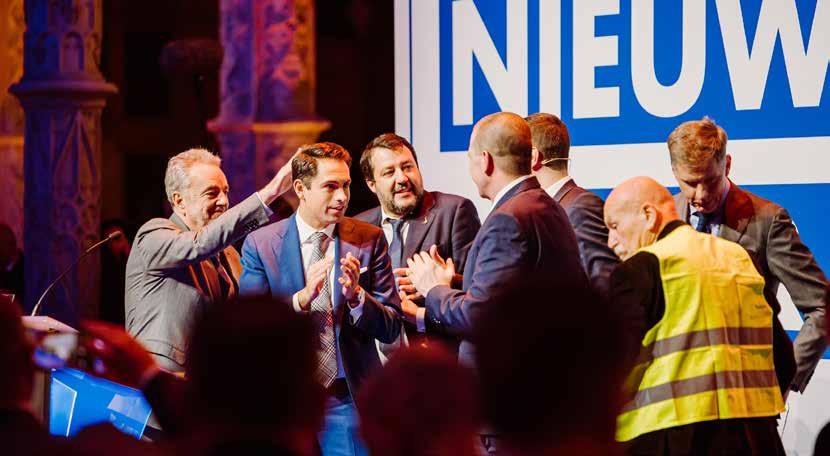
As for the national vision, it is supported by the patriotic parties and their leaders: Jordan Bardella (France), Matteo Salvini (Italy), Tom Van Grieken (Flanders), Herbert Kickl (Austria), André Ventura (Portugal), Tomio Okamura (Svoboda a Prima demokracie - SPD), Martin Helme (Estonia), Geert Wilders (The Netherlands), Andrej Danko (Slovakia), Tino Chrupalla and Alice Weidel (Germany); so many politicians who will embody the Europe of the future. For them, it is important that power is put back into the hands of the people and not those of a few out-of-touch politicians.
Over the past few years, we have witnessed a relentless headlong rush to achieve the federalist project, a subject to which we will return in the following pages. The June elections will be a unique opportunity to reverse this trend. We have every right to be optimistic: all the polls suggest that Identity and Democracy group parties will gain ground.
La visione nazionale è sostenuta invece dai partiti patrioti e dai loro leader: Jordan Bardella (Francia), Matteo Salvini (Italia), Tom Van Grieken (Fiandre), Hebert Kickl (Austria), André Ventura (Portogallo), Tomio Okamura (Repubblica ceca), Martin Helme (Estonia), Geert Wilders (Paesi Bassi), Andrej Danko (Slovacchia), Tino Chrupalla et Alice Weidel (Germania) sono i responsabili politici che incarneranno l’Europa di domani. Per questi ultimi è importante che il potere torni nelle mani del popolo e non sia più in quelle di qualche politico fuori territorio.
Gli ultimi anni sono stati teatro di una fuga dalle responsabilità sempre più evidente in seno al progetto federalista, ne parleremo nelle prossime pagine. Le elezioni di giugno saranno la nostra occasione per invertire la rotta. Abbiamo il diritto di essere ottimisti: tutti i sondaggi mettono in evidenza una crescita dei partiti membri della famiglia Identità e Democrazia.

It is important for patriots to form a sufficiently strong group in the European chamber to thwart the plans of the most relentless Europeanists. And, above all, it is vital that we build a different kind of Europe, one based on cooperation between free and sovereign States that are willing to work together of their own free will.
Per i patrioti è importante ottenere un gruppo abbastanza forte nell’emiciclo europeo, al fine di contrastare i progetti degli europeisti più accaniti. E soprattutto costruire un’altra Europa, quella delle collaborazioni fra Stati liberi e sovrani che, desiderano tuttavia lavorare insieme, a propria discrezione.
ID Party leaders gathered in Brussels in November 2023

Cooperation implies mutual respect, as in a shared flat, where everyone is free to manage their own space as they see fit, but must agree on the tasks that need to be managed jointly, without anyone being able to impose their vision on the others.
La collaborazione si fonda sul rispetto reciproco, proprio come in una co-locazione, in cui ognuno è libero di gestire il proprio spazio come preferisce, ma in cui è importante mettersi d’accordo sui compiti da gestire in comune, senza che nessuno possa di fatto imporre la propria visione agli altri.
How will the vote be conducted?
Voting will be conducted according to the proportional representation system, simultaneously in each of the Member States, on the basis of lists drawn up in advance within each country. Estonians will vote for Estonians, Czechs for Czechs and the Flemish for the Flemish.
In future elections, the ID Party is the only party that will be fighting to keep it that way. The Europhiles hope to introduce transnational lists, which could require you to vote for people of a nationality other than your own that you probably won’t even know. This is total nonsense!
You will therefore be able to vote for the list of your choice: it will bear the name of the national party you know: Rassemblement National (National Rally) in France, Alternative für Deutschland in Germany, Vlaams Belang in Flanders, Lega in Italy, EKRE in Estonia, Partij voor de Vrijheid in the Netherlands, Freiheitliche Partei Österreichs in Austria, Svoboda a Prima Demokracie in the Czech Republic, Chega in Portugal, Slovenská národná strana in Slovakia, etc.
Lo scrutinio si svolgerà secondo il sistema proporzionale, simultaneamente in ogni Stato membro, sulla base di liste precedentemente stabilite in ogni singolo paese. Così gli Estoni voteranno per candidati estoni, i Cechi per candidati cechi e i Fiamminghi per candidati fiamminghi.
Per le elezioni future, il partito ID è l’unico che si batterà affinché questo sistema resti in piedi. Gli europeisti desiderano infatti instaurare liste transnazionali, cosicché potreste dover votare per persone di nazionalità diversa dalla vostra e che, per la maggior parte, non conoscerete. Non ha senso!
Potrete quindi votare per la lista che preferite: avrà il nome nazionale che vi è noto (Rassemblement National in Francia, Alternative für Deutschland in Germania, Vlaams Belang nelle Fiandre, Lega in Italia, EKRE in Estonia, Partij voor de Vrijheid nei Paesi Bassi, Freiheitliche Partei Österreichs in Austria, Svoboda a Prima Demokracie nella Repubblica Ceca, Chega in Portogallo, Vazrazhdanein Bulgaria, Slovenská národná strana in Slovacchia, e così via).

The number of members elected to the European Parliament per country mainly depends on its demographic clout:
Germany: ............................... 96
France: .................................. 81
Italy: ...................................... 76
Spain: .................................... 61
Poland: .................................. 53
Romania: ............................... 33
Bulgaria: ................................ 17
Croatia: .................................. 12
The Netherlands: .................... 31
Portugal: ................................ 29
Belgium: ................................ 22
Czech Republic: ..................... 21
Greece: .................................. 21
Hungary: ............................... 21
Austria: .................................. 20
Denmark: .............................. 15
Slovakia: ................................ 15
Finland: ................................. 15
Ireland: ................................. 14
Lithuania: .............................. 11
Latvia: ................................... 9
Slovenia: ................................ 9
Estonia: ................................. 7
Cyprus: .................................. 6
Malta: .................................... 6
Luxembourg: ......................... 6
The European elections will take place over 4 days, from 6 to 9 June, according to the schedule below.
Thursday 6 June: Netherlands.
Friday 7 June: Ireland, Czech Republic
Saturday 8 June: Latvia, Malta, Slovakia, Czech Republic
Sunday 9 June: Austria, Belgium,
Il numero di deputati al Parlamento europeo per paese dipende sostanzialmente dal peso demografico del paese in questione:
Germania: .............................. 96
Francia: ................................. 81
Italia: ..................................... 76
Spagna: .................................. 61
Polonia: ................................. 53
Romania ................................ 33
Bulgaria ................................. 17
Croazia: ................................. 12
Paesi Bassi: ............................ 31
Portogallo: ............................. 29
Belgio: ................................... 22
Cechia: .................................. 21
Grecia: ................................... 21
Ungheria: .............................. 21
Austria: .................................. 20
Danimarca: ............................ 15
Slovacchia .............................. 15
Finlandia: .............................. 15
Irlanda: ................................. 14
Lituania: ................................ 11
Lettonia: ................................ 9
Slovenia: ................................ 9
Estonia: ................................. 7
Cipro: .................................... 6
Malta: .................................... 6
Lussemburgo: ........................ 6
Le elezioni europee si terranno in quattro giorni, dal 6 al 9 giugno, secondo il calendario riportato di seguito.
Giovedì 6 giugno: Paesi Bassi
Venerdì 7 giugno: Irlanda, Repubblica Ceca
Sabato 8 giugno: Lettonia, Malta, Slovacchia, Repubblica Ceca
Bulgaria, Croatia, Cyprus, Denmark, Estonia, Finland, France, Germany, Greece, Hungary, Italy, Lithuania, Luxembourg, Poland, Portugal, Romania, Slovenia, Spain and Sweden
Domenica 9 giugno: Germania, Austria, Belgio, Bulgaria, Cipro, Croazia, Danimarca, Spagna, Estonia, Finlandia, Francia, Grecia, Ungheria, Italia, Lituania, Lussemburgo, Polonia, Portogallo, Romania, Slovenia, Svezia
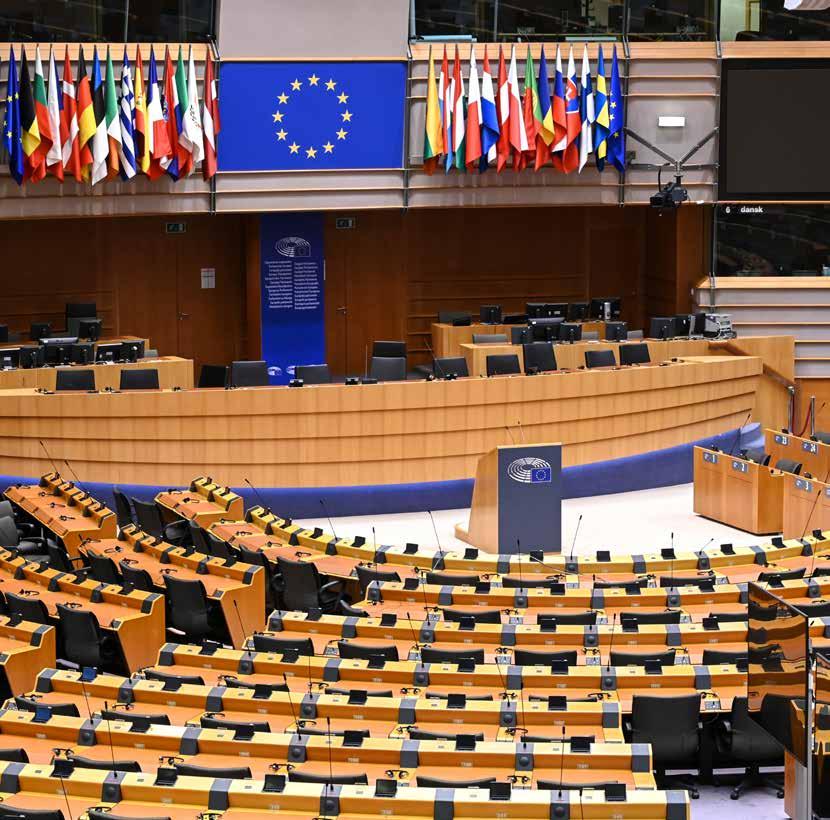
Deputato francese e delegato agli affari europei del Rassemblement National (Francia) French MP and delegate for European affairs of the Rassemblement National (France)
The European elections to be held in the now 27 Member States are crucial: the vast political family of patriots must demonstrate its cohesion and the links that unite each of its parties. Jordan Bardella and I have been talking to each of the leaders over the last few months in order to strengthen these ties.
In the four corners of the continent, the latest results from the ballot boxes have not failed to raise a wave of optimism and hope in these gloomy times: Marine Le Pen scored a historic result in the last presidential election, and the ensuing legislative elections saw 89 Rassemblement National MPs take their seats in the Assembly; across the Alps, Italy has chosen a government that includes Matteo Salvini’s Lega, our historic ally; in Austria, Flanders and Estonia, patriots are on a roll.
None other than our political family best embodies the European motto that has now been hijacked by the EU: united in diversity. We will never resign ourselves to seeing our particularities, our national cultures and our histories disappear into the European magma; we will never accept that the unelected Commission in Brussels imposes its policies on rooted peoples; we will never cease to defend those
Le elezioni europee che si terranno negli ormai 27 Stati membri sono fondamentali: la grande famiglia politica dei patrioti deve dimostrare la propria coesione e i legami che uniscono ogni partito. Per consolidarli, in questi ultimi mesi mi sono intrattenuto, al fianco di Jordan Bardella, con ognuno dei leader.
Ai quattro angoli del continente, i ragguagli provenienti dalle urne hanno sicuramente sollevato una ventata di ottimismo e di speranza in tempi tuttavia cupi: Marine Le Pen ha ottenuto un punteggio storico in occasione delle ultime elezioni presidenziali, mentre le elezioni legislative che si sono tenute in seguito hanno consentito a 89 deputati del Rassemblement National di entrare in Assemblea; al di là delle Alpi, l’Italia ha scelto un governo in cui compare la Lega di Matteo Salvini, nostra alleata storica; in Austria, nelle Fiandre e in Estonia, i patrioti hanno il vento in poppa.
Nessuno meglio della nostra famiglia politica può incarnare il motto europeo oggi così fuorviato dall’UE: uniti nella diversità. Noi non ci rassegneremo mai a vedere le nostre peculiarità, le nostre culture nazionali e le nostre storie scomparire nel magma europeo, non accetteremo mai che la Commissione non eletta di Bruxelles

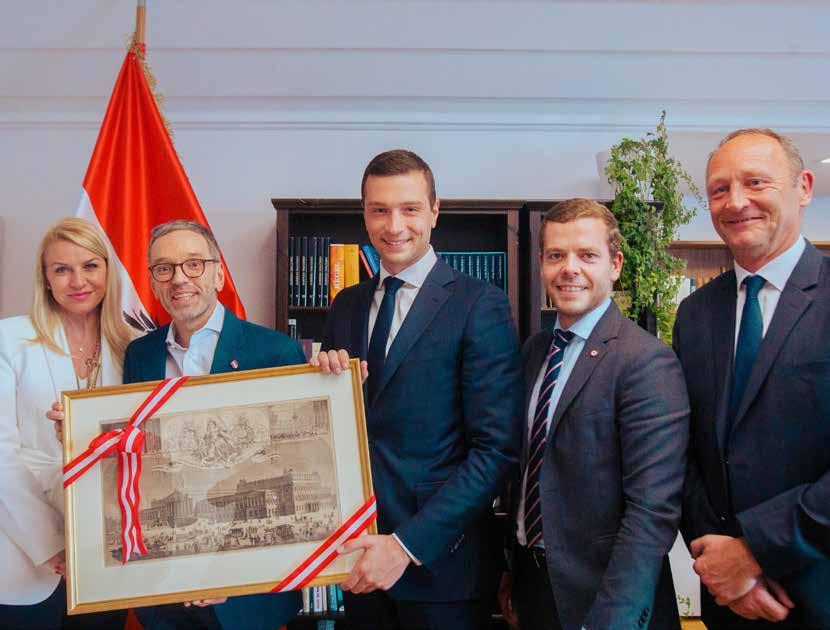
Thibaut François, deputato francese e delegato agli affari europei del Rassemblement National (Francia)
Thibaut François, French MP and delegate for European affairs of the Rassemblement National (France) with Jordan Bardella (president of the RN) and Herbert Kickl (president of the FPÖ)
countries, such as Hungary and Poland, that are hounded and then bludgeoned because they have the misfortune not to submit to the objurgations of the Europeanists; we will strongly oppose our countries being opened up to the four winds of globalisation, which destroys jobs and landmarks and creates insecurity in even the most remote villages of France.
The Rassemblement National will never replace the French flag with the European flag, as Emmanuel Macron did under the Arc de Triomphe, but, contrary to the misconceptions spread by our political opponents, our party is not anti-European.
“Di fronte alla determinazione degli europeisti, dobbiamo più che mai, seguire
imponga le proprie politiche ai popoli già consolidati; non smetteremo mai di difendere senza sosta i paesi che, come l’Ungheria e la Polonia, sono perseguitati e maltrattati, perché hanno l’onta di non sottomettersi alle invettive degli europeisti più isterici; noi ci opporremo con forza affinché i nostri paesi non vengano esposti ai quattro venti della globalizzazione, che distrugge i posti di lavoro e i punti di riferimento, creando insicurezza fin nei più reconditi centri abitati dell’Esagono.
Il Rassemblement
“Faced with the determination of the proEuropeans, we must, more than ever, pursue the path of the union of patriots”
The Europe of free nations that we are calling for refers both to an identity of civilisation, which France has largely helped to shape - through its history, its culture and its vision of democracy - and to a framework for cooperation between consenting countries represented by legitimately elected leaders - which neither Ursula von der Leyen, President of the Commission, nor Charles Michel, her counterpart on the European Council, are.
National non sostituirà mai la bandiera francese con quella europea, come fece Manuel Macron sotto l’Arco di Trionfo, ma, contrariamente alle idee sbagliate diffuse dai nostri avversari politici, il nostro partito non è antieuropeo. L’Europa delle Nazioni libere da noi auspicata si rifà al contempo a un’identità culturale che la Francia ha largamente contribuito a modellare (con la sua storia, la sua cultura, la sua visione della democrazia) nonché a una cornice di collaborazione tra paesi consenzienti e rappresentati da dirigenti eletti legittimamente, non come Ursula von der Leyen, presidentessa
This Europe of the nations is the antithesis of the European Union, an artificial and opaque construction in whose meanders leaders can impose their anti-social and anti-national policies on the people, hidden from view. Its Parliament, which should be the forum for debate, is today the stage for one of the most worrying democratic scandals of recent decades: Socialist parliamentarians are suspected of having benefited from money from Qatar to further their interests. Let’s not forget that this Gulf state is far from respecting human rights and is, in many respects, hostile to our democracies.
Faced with the determination of the Europeanists to impose their project, we must, more than ever, continue along the path of the union of patriots, through cooperation, exchanges and coordination of the votes of all the patriotic parties in the European Parliament, regardless of the group in which they sit. That’s how we’ll be able to throw our weight behind reversing the trend and giving the people of Europe back control of their own destiny.
della Commissione, o Charles Michel, il suo corrispettivo al Consiglio europeo.
Questa Europa delle Nazioni è agli antipodi dell’Unione europea, che è invece un artificio fosco, nei cui meandri i dirigenti possono imporre ai popoli le proprie politiche antisociali e antinazionali, al riparo da ogni sguardo. Il suo Parlamento, che dovrebbe essere luogo di dibattito, oggi è invece teatro di uno degli scandali democratici più inquietanti degli ultimi decenni: alcuni parlamentari socialisti sono sospettati di avere beneficiato del denaro del Qatar per interessi personali; si ricordi che questo paese del Golfo è lontano dal rispetto dei diritti umani ed è anche ostile alle nostre democrazie in svariati punti.
Di fronte alla determinazione degli europeisti nell’imposizione del loro progetto, noi dobbiamo, più che mai, seguire la strada dell’unione dei patrioti, mediante la collaborazione, gli scambi e un coordinamento dei voti di tutti i partiti patrioti al Parlamento europeo, a prescindere dal gruppo di cui fanno parte. In questo modo, potremo far sentire tutto il nostro peso, facendo invertire la rotta e restituendo ai popoli d’Europa la padronanza del loro destino.
Membro del Parlamento europeo, capo della delegazione italiana, Lega Member of the European Parliament, leader of the Italian delegation, Lega
The Party I represent at the European parliament, Lega, was founded in 1989 by the merging of several regional autonomist movements. Its main political objective was to reinforce the Italian long-standing tradition of Regions and local autonomies in reforming the State in a federalist direction.
In Europe Lega has reproduced this vision, being present in the European Parliament since 1989. Throughout time, we established enduring relationships with like-minded European parties, which nowadays constitute Identity and Democracy representing more than 21 million people. Our mission is to promote a democratic Europe that lays its foundations on the cooperation of its peoples and defends traditional values, jobs and local industries.
Historically, we have strenuously opposed a European model of centralisation, which has imposed supranational public powers in many fields, eroding national sovereignty. The path towards economic and monetary integration enacted with the Maastricht Treaty is the most vivid example of Europe’s confused plan dictating irrational conditions on Member States and concurrently jeopardising a real
Il partito che rappresenta il Parlamento europeo, la Lega, è stato fondato nel 1989 con la fusione di vari movimenti autonomisti regionali. Il suo principale obiettivo politico era rafforzare l’antica tradizione italiana delle regioni e delle autonomie locali, riformando lo Stato in senso federalista.
In Europa, la Lega ha riprodotto questa visione con la sua presenza al Parlamento europeo sin dal 1989. Nel corso del tempo, abbiamo instaurato relazioni stabili con partiti europei che condividono le stesse idee e costituiscono oggi Identità e Democrazia, rappresentando oltre 21 milioni di persone. La nostra missione è promuovere un’Europa democratica che si basi sulla collaborazione dei suoi popoli e difenda i valori tradizionali, il lavoro e le industrie locali.
Storicamente, ci siamo fermamente opposti a un modello europeo di centralizzazione che ha imposto poteri pubblici sovranazionali in vari ambiti, erodendo la sovranità nazionale. La strada verso l’integrazione economica e monetaria, promulgata con il trattato di Maastricht, è l’esempio più evidente del programma confuso dell’Europa, che detta condizioni irrazionali agli Stati membri e pregiudica
Marco Campomenosi, membro del Parlamento europeo, capo della delegazione italiana, Lega
Marco Campomenosi, member of the European Parliament, leader of the Italian delegation, Lega

economic expansion.
In our vision, Europe was never envisaged to be a superstate escaping the democratic control of citizens. We uphold, on the contrary, a “doing less but better” approach, particularly in sensitive fields as defence. We believe in a community of sovereign States whereby convergent policy action in few and effectively managed common areas is key in creating a true system that respects the diversity of its peoples. The European bureaucratic apparatus should not be a caste but rather offer full transparency and accountability for citizens, serving an efficient protection of national players. Our vision
al contempo una vera espansione economica.
Nella nostra prospettiva, l’Europa non è mai stata vista come un super-Stato che sfugge al controllo democratico dei cittadini. Al contrario, difendiamo un approccio basato sul “fare meno, ma meglio”, in particolare nei settori critici come la difesa. Crediamo in una comunità di Stati sovrani, dove l’azione politica convergente in settori comuni poco numerosi e gestiti efficacemente è essenziale per creare un sistema vero e proprio, che rispetti la diversità dei propri popoli. Il sistema burocratico europeo non dovrebbe essere una casta, bensì dovrebbe offrire
has never changed but has only intensified in time. We remain strong our pillars and adapt them to changing political and economic circumstances, always looking for the Member States’ best interests.
Unfortunately, over the years, we have witnessed a tendency for overregulation, which has flooded Member States, economic operators and citizens with delusional rules. Such pattern was exacerbated, particularly during the current term, by a disastrous political agenda whose virtuous ambitions have not matched on ground realities. Von der Leyen Commission, supported by an ever more incomprehensible Popular-Socialists axis, has put forward a plethora of legislative interventions that undermines the competitiveness of our industries, our agricultural production and our jobs in the face of competition by third Countries, not to mention the attacks to our fundamental spaces of freedom and democracy. The Green Deal with its ‘Fit for 55’ package, social media regulation like DSA and the Treaty reform called in the context of the ‘Conference on the
una trasparenza e una responsabilità totale per i cittadini, al servizio di una tutela efficace degli operatori nazionali. La nostra prospettiva non è mai cambiata, anzi, col tempo si è intensificata. Resteremo fedeli ai nostri pilastri e li adatteremo all’evoluzione delle circostanze politiche ed economiche, orientandoci sempre all’interesse supremo degli Stati membri.
“Nella nostra prospettiva, l’Europa non è mai stata vista come un super-Stato che sfugge al controllo democratico dei cittadini”
“In our vision, Europe was never envisaged to be a superstate escaping the democratic control of citizens”
Sfortunatamente, nel corso degli anni, siamo stati testimoni di una tendenza alla sovraregolamentazione che ha inondato gli Stati membri, gli operatori economici e i cittadini di regole deliranti. Questa tendenza è stata esacerbata soprattutto nel corso della legislatura attuale, a causa di un programma politico disastroso, le cui ambizioni virtuose non corrispondevano alle realtà sul campo. La Commissione Von Der Leyen, sostenuta da un asse popolare-socialista sempre più incomprensibile, ha proposto una pletora di interventi legislativi che minano la competitività delle nostre industrie, della nostra produzione agricola e del nostro lavoro rispetto alla concorren-
future of Europe’ are few examples of such fanatic-like attitude.
In an era of systemic shocks, whereby geopolitical relations and supply chains are destabilised, Europe’s irrational ideology has exposed a poor judgment of events taking place on the global scene, leaning towards a real process of regression and deindustrialization of the entire continent. Against such background, our goal in the European arena does not change: we must be decisive in fighting dangerous and inconsistent policies that work against our security as well as our economic and social development. The only hope, in our views, is to build a strong and united European centre-right alternative to a socialist democratic majority that for too long has monopolised decision-making. Brussels must be freed from the bureaucratic drift and left-wing radicalism driving policy action and the current massive wave of protests shows European citizens have noticed the enormous damages they have caused.
za di paesi terzi senza, parlare degli attacchi ai nostri spazi fondamentali di libertà e democrazia. Il Green Deal con il suo pacchetto “Fit for 55”, la regolamentazione dei social media come la legge sui servizi digitali e la riforma del trattato richiesta nel contesto della “Conferenza sul futuro dell’Europa” sono solo qualche esempio di questa tendenza fanatica.
Nell’era degli shock sistemici, in cui le relazioni geopolitiche e le catene di approvvigionamento sono destabilizzate, l’ideologia irrazionale dell’Europa ha rivelato una valutazione sbagliata degli eventi che si svolgono sulla scena mondiale, portandosi inesorabilmente sulla strada del regresso e della disindustrializzazione complessiva del continente. In questo contesto, il nostro obiettivo nel cuore dell’arena europea non cambia: dobbiamo essere decisivi nella lotta contro le politiche pericolose e incoerenti contrarie alla nostra sicurezza e al nostro sviluppo economico e sociale. L’unica speranza, secondo noi, è costruire un’alternativa europea di centrodestra forte e unita rispetto a una maggioranza socialdemocratica che per troppo tempo ha monopolizzato il sistema decisionale. Bruxelles deve essere liberata dalla deriva burocratica e dal radicalismo di sinistra che dirigono l’azione politica, del resto l’attuale ondata massiccia di proteste dimostra che i cittadini europei hanno notato i gravi danni che hanno causato.
Presidente di Svoboda a přímá demokracie, membro del direttivo del partito ID President of Svoboda a přímá demokracie, member of the ID Party Bureau
Our vision of Europe is made up of free and sovereign Nation States, all working together.
We aim to defend the “right of veto” and to overturn absurd regulations. Some studies show that Brussels dictates between 65% and 85% of our laws. That’s not our idea of democracy, it’s diktat and tyranny! Nowadays in our Parliament, we often have to make do with applying EU directives.
We want to put an end to EU subsidies that benefit harmful projects: they only serve to corrupt the elite and the industrial companies of the Nation States.
The EU aspires to become a unitary state, which is why we are firmly opposed to efforts aimed at building a common European army and police force and at establishing a common centralised foreign policy.
Our priority is also to stop illegal immigration and Islamisation. We intend to block immigration quotas, put an end to the European pact on immigration, defend our borders and expel illegal immigrants.
Multiculturalism is a disaster and a new form of racism directed
La nostra visione dell’Europa è fatta di Stati-Nazioni liberi e sovrani che collaborano.
Noi vogliamo difendere il “diritto di veto” e annullare le regolamentazioni assurde. Alcuni studi indicano che Bruxelles decide in merito al 65 - 85 % delle nostre leggi. Non è questa la nostra idea di democrazia: questo è diktat e tirannia! Oggi, nel contesto del nostro Parlamento, dobbiamo spesso accontentarci di applicare le direttive dell’UE.
Vogliamo porre fine alle sovvenzioni dell’UE per i progetti nocivi: servono solo a corrompere le élite e le imprese industriali degli Stati - Nazioni.
L’UE vuole diventare uno Stato unitario, ecco perché noi ci opponiamo fermamente alla volontà di creare un esercito e una polizia europei comuni, predisponendo una politica estera centralizzata comune.
È altresì nostra priorità fermare l›immigrazione illegale e l’islamizzazione. Vogliamo arginare le quote di immigrati, porre fine al patto europeo sull’immigrazione, difendere i confini ed espellere gli immigrati illegali.
Il multiculturalismo è un disastro nonché una nuova forma di razzismo:
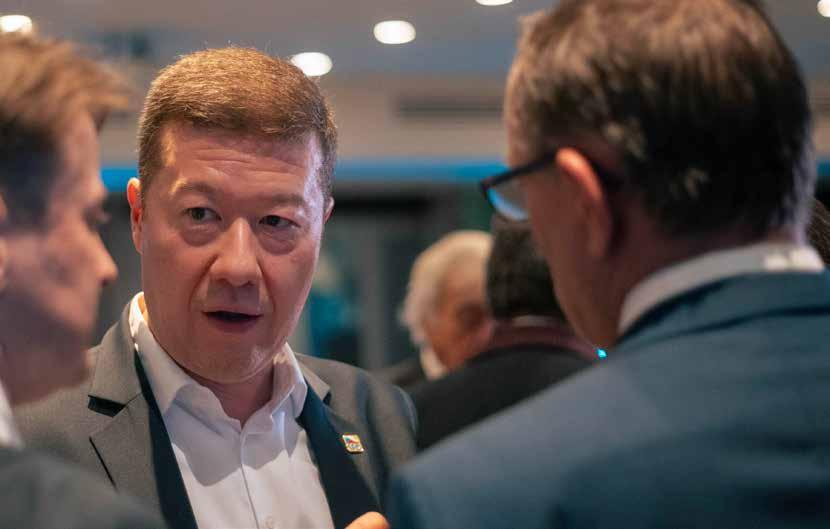
against the nations and peoples of Europe. The European Union openly supports mass immigration and the Islamisation of European and EU Commissioner Ylva Johansson overtly upholds that Europe needs increasing numbers of immigrants.
The European Union is the archenemy of Europe and European nations. Common sense dictates that when I am invited into someone’s home, it is my duty to accept my host’s rules. Yet multiculturalists claim that it is up to us to adapt to the habits, rules and values of immigrants!
The EU elite is intent on destroying the nations of Europe through mass immigration. People with no homeland, no national pride and no traditional Christian values could easily be governed by the globalists who are seeking to establish a new
Tomio Okamura, presidente di Svoboda a přímá demokracie, membro del direttivo del partito ID, in occasione della riunione dei leaders del partito ID a Bruxelles
Tomio Okamura, President of Svoboda a přímá demokracie, member of the ID Party Bureau, at the meeting of ID Party leaders in Brussels
è rivolto infatti contro le nazioni e i popoli europei. L’Unione europea sostiene apertamente l’immigrazione di massa e l’islamizzazione dell’Europa. Il commissario europeo Ylva Johansson dichiara apertamente che l’Europa necessita sempre più di immigrati.
L’Unione europea è il nemico mortale dell’Europa e delle nazioni europee. Il buonsenso direbbe che, se vado a casa di qualcuno, è mio dovere accettare le regole di chi mi ospita. I multiculturalisti affermano che tocca noi adattarci alle abitudini, alle regole e ai valori degli immigrati.
Le élite dell’UE vogliono distruggere le nazioni europee con l’immigrazione di massa. I popoli senza patria, senza orgoglio nazionale e senza valori cristiani tradizionali potranno essere facilmente governati dai globalisti che intendono stabilire un nuovo or-
totalitarian world order, devoid of nations, families, traditional values and religions, with a single central world power to govern all peoples and reduce them to slavery. We refuse to allow our people to be killed, raped, attacked and robbed in the streets as is currently the case in Western Europe.
We believe that the EU’s Green Deal is extremely dangerous for our economy. We are keen to avoid this idiotic plan and exit the CO2 emissions trading scheme. We openly reject plans to ban the production of combustion engines and to force citizens to buy electric cars. Our vision is to restore our independence in terms of energy. We are saying “NO” to the common European currency, namely the euro, and wish to preserve our national currency, the Czech koruna, and we are also fighting for the right for citizens to pay in cash.
dine mondiale totalitario, in cui non ci saranno più nazioni, non ci saranno più famiglie, non ci saranno più valori tradizionali e non ci saranno più religioni. Esisterà un solo potere centrale mondiale che governerà tutti i popoli, riducendoli allo stato di schiavitù. Noi non vogliamo che il nostro popolo sia ucciso, violato, attaccato e derubato per la strada come accade in Europa occidentale.
“L’unione europea è il nemico mortale dell’Europa”
“The European Union is the arch-enemy of Europe and European nations”
Censorship and political correctness are a great threat to our freedom. We emphasise civil rights and freedom of expression. We reject the “Big Brother” programme and efforts to create a central European digital identification system, etc.
We reject the Common Agricultural Policy and support a return to food
Riteniamo che il Green Deal dell’UE sia molto pericoloso per la nostra economia. Vogliamo sfuggire a questo programma stupido e uscire dal sistema delle quote di emissioni di CO2. Noi rifiutiamo apertamente i progetti di divieto della produzione dei motori a combustione e di imposizione delle auto elettriche ai cittadini. Il nostro obiettivo è ripristinare la nostra indipendenza energetica. Diciamo “NO” alla moneta comune europea, l’euro, noi vogliamo mantenere la nostra moneta nazionale, la corona ceca, e ci battiamo anche per il diritto dei cittadini a pagare in contanti.
La censura e il politicamente corretto rappresentano un grande pericolo per la nostra libertà. Siamo per i diritti civili e la libertà d’espressione. Noi lottiamo contro il programma “Big Brother” e l’idea di creare un’identificazione digitale centrale europea, ecc.
self-sufficiency for our country.
We are opposed to the neo-Marxist, sexist and multicultural agenda and indoctrination, and we defend the values of the traditional family. We propose the abolition of positive discrimination for minorities and aim to put an end to the funding of political Marxist NGOs.
We advocate our citizens’ right to self-defence and to own firearms, because the EU elite want citizens to be stripped of their weapons, to make them easier to submit.
We cherish the idea of a Europe of free nations, which is why we oppose the European Union, which is seeking to enslave them!
Rifiutiamo la politica agricola comune e sosteniamo il ritorno all’autosostentamento alimentare del nostro paese.
Lottiamo contro il programma e l’indottrinamento neomarxista, sessista, e multiculturale, difendendo invece la famiglia tradizionale. Proponiamo l’abolizione o la discriminazione positiva delle minoranze, inoltre desideriamo porre fine al finanziamento delle ONG politiche marxiste.
Noi difendiamo il diritto dei cittadini all’autodifesa e il diritto di possedere armi da fuoco, perché le élite dell’UE vogliono che i cittadini siano disarmati, in modo che sia più facile farne i propri servi.
Noi amiamo l’Europa delle nazioni libere, ecco perché ci opponiamo all’Unione europea, che vuole asservirle!
Membro del direttivo del partito ID, Freiheitliche Partei Österreichs
Member of the ID Party Bureau, Freiheitliche Partei Österreichs
Our founding fathers dreamt of a Europe that would guarantee peace, freedom and prosperity for all. What we now have is an authoritarian bureaucracy that determines how brown chips should be, and hopes to abolish the Nation States as soon as possible. We can put a stop to this unwelcome development thanks to the forthcoming European elections.
Ursula von der Leyen is one person who will not be on the ballot paper in 2024. In 2019, she was unexpectedly elevated to the position of Commission President following a typical backroom deal in Brussels. She is the near-perfect embodiment of the elite project that the EU now stands for. In short, this avid business-airline-user has hardly ever led the life of an ordinary citizen, and hardly ever taken an interest in ordinary citizens.
This ruthless opportunist has grabbed everything she could get her hands on and, in a kind of empowerment, has taken on one issue after another, attracting ever more power to Brussels in the process: from the Green Deal to the purchasing of Coronavirus vaccines, from the European pact on migration to the war in Ukraine; Ms Von der Leyen is the figurehead of
I padri fondatori sognavano un’Europa che garantisse la pace, la libertà e la prosperità per tutti. Ciò che abbiamo ottenuto è una burocrazia autoritaria che determina il grado di cottura delle patatine fritte e che intende abolire gli Stati-Nazioni al più presto possibile. Con le prossime elezioni europee, abbiamo la possibilità di porre fine a questa evoluzione nefasta.
C’è un nome che non comparirà sulle schede elettorali nel 2024: Ursula von der Leyen. Nel 2019, le fu sorprendentemente conferito il titolo di presidentessa della Commissione, in seguito a un accordo dietro le quinte in stile Bruxelles. È l’incarnazione quasi perfetta del progetto d’élite in cui si è trasformata l’UE. Basti dire che questa fruitrice forsennata di aerei privati ha condotto la vita del cittadino normale più o meno nella stessa misera misura in cui quest’ultima la interessa.
Questa opportunista senza scrupoli si è impadronita di tutto ciò che le capitava sotto mano, in una sorta di autonomizzazione, si è appropriata di una questione dopo l’altra, concentrando così sempre più potere a Bruxelles: dal Green Deal all’acquisto dei vaccini contro il coronavirus, dal patto europeo sulle migrazioni alla guerra in
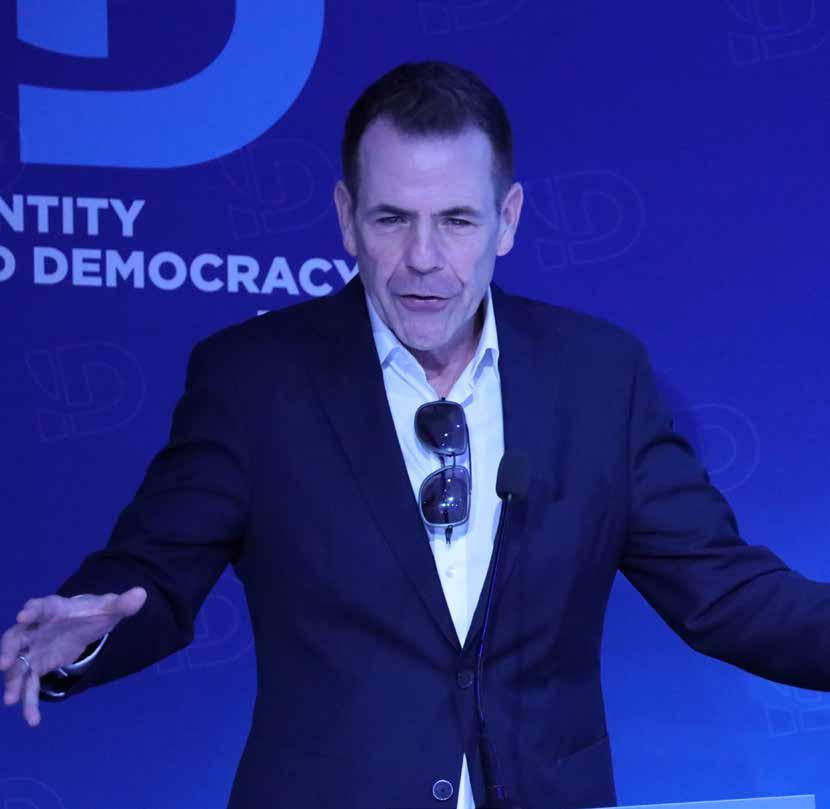
Harald Vilimsky, membro del direttivo del partito ID, Freiheitliche Partei Österreichs, alla riunione dei giovani del partito ID a Roma
Harald Vilimsky, member of the ID Party Bureau, Freiheitliche Partei Österreichs, at the ID Party youth meeting in Rome Brussels centralists. Her aim is to turn the EU into a kind of superstate while ensuring that the influence of current Member States is reduced to that of regional administrations. Anyone who thinks differently is branded a “rightwing extremist” by the speech police of this parasitic group of people.
Yet the bourgeoisie, the socialists, the
Ucraina. La signora Von der Leyen è il fiore all’occhiello dei centralisti di Bruxelles. Il suo obiettivo: trasformare l’UE in una sorta di super-Stato, in cui l’influenza degli Stati membri attuali sia ridotta a quella delle amministrazioni regionali. Chiunque la pensi diversamente viene tacciato di essere un “estremista di destra” dagli sbirri del panegirico della classe parassitaria.
Greens and the left wing are hard to tell apart within the Brussels institutions. They form a united front when it comes to selling more and more European bureaucracy as the solution to almost everything.
We, the patriotic forces in Europe, are therefore the only alternative to increasingly authoritarian centralisation. The best way to put an end to Brussels’ thirst for power and the undesirable developments of recent years is to push back and considerably reduce the Union’s bureaucratic clout. The smaller the apparatus, the less it is able to intimidate citizens with new regulations. We need to halve the Commission, halve the European Parliament and limit it to one location, halve the 70-plus EU authorities and agencies, most of which don’t really know what they’re doing anyway.
“La
Eppure i borghesi, i socialisti, i verdi e la sinistra si distinguono appena in seno alle istituzioni di Bruxelles. Costituiscono un fronte unito per vendere sempre più burocrazia europea come soluzione a quasi tutto.
“The backbone of our cooperation is mutual benefit”
Noi, le forze patriottiche d’Europa, siamo pertanto l’unica alternativa a una centralizzazione sempre più autoritaria. Il modo migliore per porre fine alla sete di potere di Bruxelles e agli sviluppi incresciosi di questi ultimi anni è respingere e ridurre considerevolmente il peso burocratico dell’Unione. Riducendo le dimensioni del sistema, se ne riduce anche la capacità di intimidire i cittadini con nuove regolamentazioni. Ridurre della metà la Commissione, ridurre della metà il Parlamento europeo limitandolo a un luogo unico, ridurre della metà le oltre 70 autorità e agenzie dell’UE, di cui la maggior parte nemmeno sa esattamente che cosa debba fare.
Reducing the size of bureaucracy must come with a transfer of powers to the Nation States. Brussels should concentrate on fewer areas than it does today, but it should implement them more effectively. “European solutions” must revert to being real solutions, and not just a blind commitment to an ideology.
Riducendo le dimensioni della burocrazia, si avrebbe conseguentemente il trasferimento delle competenze agli Stati-Nazioni. Bruxelles dovrebbe concentrarsi su meno compiti rispetto a oggi, mettendoli però in pratica con efficacia. Le “soluzioni europee” devono tornare a essere soluzioni vere, senza limitarsi a un impegno cieco in
Underlying this is our vision of a Europe made up sovereign nations, all cooperating with each other on an equal footing. The backbone of that cooperation being mutual benefit, not the ideological fantasy of a unified state that aims to re-educate its citizens, with decisions being based on its citizens’ best interests, which is rarely the case in Brussels. In our vision, the principle of subsidiarity is not an empty word, but the backbone of our cooperation. And democracy is guaranteed because action is taken by elected government members, and not by a Commission that has morphed into a politburo. Above all, we must put an end to mass immigration based on the misuse of the right of asylum. We must quash the deliberate renunciation of any control by European asylum legislation, which is totally absurd and dysfunctional. The uncontrolled influx of millions of people from other cultures into Europe’s social systems is undermining prosperity, security and democracy. The principle should be as follows : no asylum rights for anyone who turns up at the external border.
The forthcoming European elections are likely to mark a turning point. If current opinion polls are anything to go by, it seems that a growing proportion of European citizens will reject current Brussels policies.
favore di un’ideologia.
Dietro questo concetto si cela la nostra visione di un’Europa di nazioni sovrane, che collaborino le une con le altre sulla base dell’uguaglianza. Dove la spina dorsale di questa collaborazione sia il beneficio reciproco e non il fantasma ideologico di uno stato unificato, il cui intento sia rieducare i propri cittadini. Dove le decisioni siano prese al livello più adeguato a comprendere le esigenze dei cittadini. E raramente si può fare a Bruxelles. Dove il principio di sussidiarietà non sia una parola vana, ma la spina dorsale della nostra collaborazione. Dove la democrazia sia garantita, perché l’azione dipende dai governi eletti e non da una commissione che si è trasformata in politburo.
E soprattutto: dobbiamo porre fine anche all’immigrazione di massa confortata dall’abuso del diritto d’asilo. Bisogna porre fine alla rinuncia deliberata a qualsiasi controllo da parte della legislazione europea in merito all’asilo, completamente assurda e disfunzionale. L’afflusso incontrollato di milioni di persone provenienti da altre culture nei sistemi sociali europei mina la prosperità, la sicurezza e la democrazia. Il principio deve essere questo: basta col diritto alla procedura d’asilo per chiunque si presenti al confine.
Le prossime elezioni europee dovranno segnare un punto di svolta. Considerando i sondaggi attuali, emerge che una proporzione sempre maggiore di cittadini europei rifiuterà la politica attuale di Bruxelles.
Presidente di Chega, membro del partito ID Chairman of Chega, member of the ID Party
Let’s make 2024 a victorious year!
The time for European patriots is finally arriving, right after the next European elections!
The parties attached to the ID-Party, in almost all the countries where this great European political family is represented, are growing fast.
Some are a part of governments or on their way to form them, or at least in significant positions in their own country polls.
Examples of this, of which I am very proud, are parties such as Geert Wilders’ PVV in the Netherlands, the Rassemblement National now led by Jordan Bardella, always with the strong and experienced parliamentary leadership of the charismatic Marine Le Pen in France, the AfD led by the Chrupalla/Weidel duo, which is already the consistent second political force in Germany, quite distant from the socialists; Also Salvini’s LEGA Italia, EKRE, Vlaams Belang, SPD, or SME Rodina; Last, but not least is CHEGA, the party I’ve founded and that I’m very proud of.
In Portugal, a country where for the first time in the last fifty years, a rightwing political force obtained nearly
Facciamo del 2024 un anno vittorioso!
Il tempo dei patrioti europei è finalmente arrivato e si materializzerà proprio dopo le prossime elezioni europee!
I partiti legati a Identità e Democrazia, in pressoché tutti i paesi dove questa grande famiglia politica europea è rappresentata, sono in piena crescita.
Alcuni fanno parte di governi, stanno per formarne uno o quantomeno occupano posizioni significative in sede di scrutinio nei loro paesi.
Fra gli esempi di cui sono orgoglioso, ci sono partiti come il PVV di Geert Wilders nei Paesi Bassi, il Rassemblement national oggi diretto da Jordan Bardella, sempre con la leadership parlamentare forte ed esperta della carismatica Marine Le Pen in Francia, l’AfD diretta dal duo Chrupalla/ Weidel, già seconda forza politica in Germania; poi ci sono anche la Lega di Salvini, l’EKRE, il Vlaams Belang o l’SPD.
E poi non vorrei proprio dimenticare di citare Chega, il partito che ho fondato io stesso e di cui sono molto orgoglioso. In Portogallo, un paese dove, per la prima volta dopo cinquant’anni, una forza politica di destra ha ottenu-
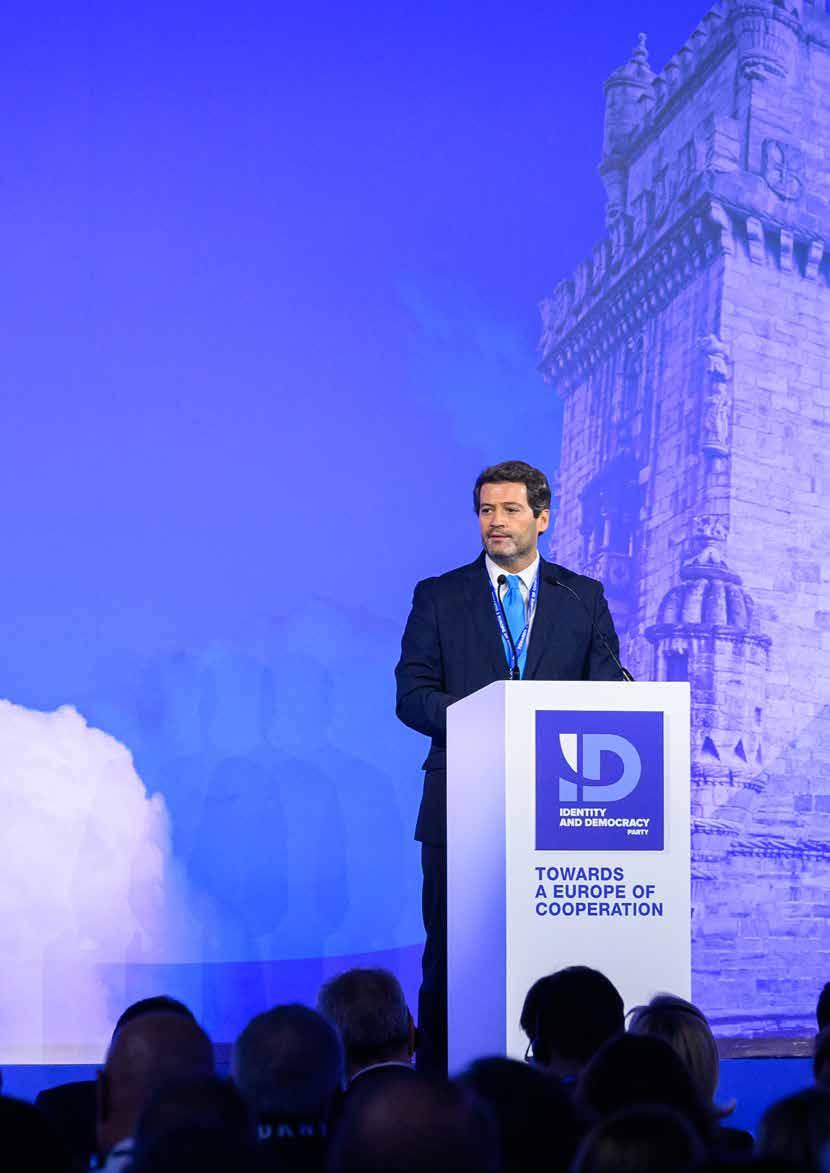
André Ventura, presidente di Chega, membro del partito ID, al Congresso del partito ID a Lisbona
André Ventura, Chairman of Chega, member of the ID Party, at the ID Party Congress in Lisbon
20% in the last legislative elections in March.
As a result of all this, polls have placed ID-Group as a potential third political force in the European Parliament!
It is therefore time, to start thinking about the transformation of the EU into essential matters, such as of sovereignty, the survival of European Nations or the protection of our common borders.
But also, problems such as the imposition of gender ideology by the so called “progressists”, single-mindedness, or concepts such as “political correctness”, or hypothetical “hate speech” with little or no legal definition, only to serve a leftist speech that wants to silence, intimidate, persecute, and in many cases condemn patriots and conservatives, for its own survival.
to circa il 20% alle ultime elezioni legislative di marzo.
Risultato: secondo i sondaggi, il gruppo ID si posiziona come terza forza politica al Parlamento europeo!
“È venuto il tempo dei patrioti”
“The time for European patriots is finally arriving”
Perciò è venuto il momento di riflettere sulla trasformazione dell’UE in merito a questioni fondamentali, come la sovranità, la sopravvivenza delle nazioni europee o la tutela dei nostri confini comuni. Ma è ora anche di risolvere problemi come l’imposizione dell’ideologia di genere da parte dei sedicenti “progressisti”, il pensiero unico concetti come il “politicamente corretto” o ancora l’ipotetico “discorso di odio” con una definizione giuridica poco o non definita, soltanto per servire un’idea di sinistra che vuole azzittire, intimidire, perseguitare e in numerosi casi condannare i patrioti e i conservatori, ai fini della propria stessa sopravvivenza.
So today, we finally have the ideal context to truly unite, and achieve the transformation of European Union values, which we have seen subverted over time by the power of socialists and social democrats, transforming Europeans who once were strong, into weak persons, subjugated inwards and defenseless outwards.
This is a time when the goals must be bigger than us, when we are
Oggi disponiamo peraltro del contesto ideale per unirci effettivamente, per realizzare la trasformazione dei valori dell’Unione europea, che sono stati sovvertiti nel corso del tempo da parte del potere dei socialisti e dei socialdemocratici, trasformando gli europei, un tempo coraggiosi, in persone deboli, sottomesse all’interno e senza difesa all’esterno.
experiencing global instability, that forces us to be able to make difficult decisions, in short periods of time.
Two wars have broken out on our doorstep, others are unfortunately developing, but there is one particularly dangerous within Europe: the ideological war, that is equally destructive!
Destructive of values, concepts, secular or even millennial cultures;
Destructive of homes, families, societies;
Destructive of economies, peoples’ self-determination, and countries sovereignty.
It is up to us to take this historic moment and opportunity within our hands and turn it into the salvation of this ancient and beloved continent.
Finally, this is the greatest opportunity we have, to unite, and confront socialism, that is the engine of all this destruction, transforming 2024 into a true and necessary year of victory!
Viviamo in un’epoca in cui gli obiettivi devono essere più grandi di noi, in cui regna un’instabilità mondiale che ci costringe a prendere decisioni difficili in poco tempo.
Ben due guerre sono scoppiate vicino a noi, altre purtroppo stanno prendendo corpo, ma ce n’è una che è particolarmente pericolosa, proprio nel cuore dell’Europa: la guerra ideologica, altrettanto distruttrice! Distruttrice di valori, di concetti, di culture secolari o anche millenarie.
Distruttrice dei lignaggi, delle famiglie, delle società. Distruttrice delle economie, dell’autodeterminazione dei popoli e della sovranità dei paesi.
Tocca a noi cogliere questo momento e questa opportunità storica per ripristinare appieno i rapporti con questo continente antico e prediletto.
Per concludere, questa è la più grande opportunità che ci si presenti per unirci e affrontare il socialismo, che è il motore di tutta questa distruzione, trasformando il 2024 in un anno di vittoria vero e necessario!
Co-leader di Alternative für Deutschland
Co-leaders of Alternative für Deutschland
We associate Europe with a positive vision: a free continent in prosperity, linked through advanced infrastructure, home to a civilization with common goals. However, we are critical of the European Union because it destroys prosperity and endangers peace. We want free and peaceful trade on the continent.
As an economic and export nation, Germany is terribly affected by the EU’s sanctions policy. Unfortunately, the German government has joined the EU’s sanctions policy - with disastrous consequences both for industry and citizens. Energy prices have skyrocketed. Companies are leaving or they are at least ready to do so. Associations and entrepreneurs warn of deindustrialization. We want to terminate sanctions - for the benefit of both sides.
The EU and its elites have abandoned the founding fathers’ original idea of a European community. They want to turn the EU into a super state. Our goal is a Europe in which free nations unite and band together. Our central interests are a common market, the effective protection of the external borders against illegal immigration and strategic autonomy in questions of security
Noi associamo l’Europa a una visione positiva: un continente libero, prospero, con connessioni infrastrutturali avanzate, che ospiti una civiltà con obiettivi comuni. Tuttavia, critichiamo l’Unione europea perché distrugge la prosperità e emette in pericolo la pace. Vogliamo un commercio libero e pacifico nel continente.
In qualità di nazione economica esportatrice, la Germania è terribilmente colpita dalla politica di sanzioni dell’Unione europea. Sfortunatamente, il governo tedesco si è adeguato a questa politica, con conseguenze disastrose sia per l’industria sia per i cittadini. I prezzi dell’energia sono aumentati a dismisura. Le aziende lasciano il paese o sono disposte ad andarsene. Le associazioni e gli imprenditori mettono in guardia contro la disindustrializzazione. Noi vogliamo porre fine alle sanzioni, nell’interesse di entrambe le parti.
L’UE e le sue élite hanno abbandonato l’idea originale dei padri fondatori di una comunità europea. Vogliono trasformare l’UE in un super-Stato. Il nostro obiettivo è un’Europa in cui le nazioni libere si uniscano e si raggruppino. I nostri principali interessi constano di un mercato comune,
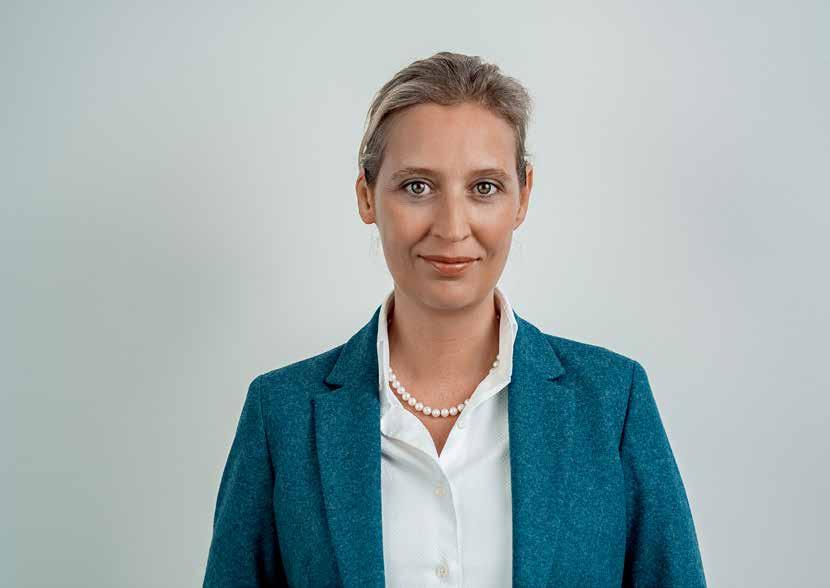
Tino Chrupalla e Alice Weidel, co-leader di Alternative für Deutschland
Tino Chrupalla and Alice Weidel, co-leaders of Alternative für Deutschland
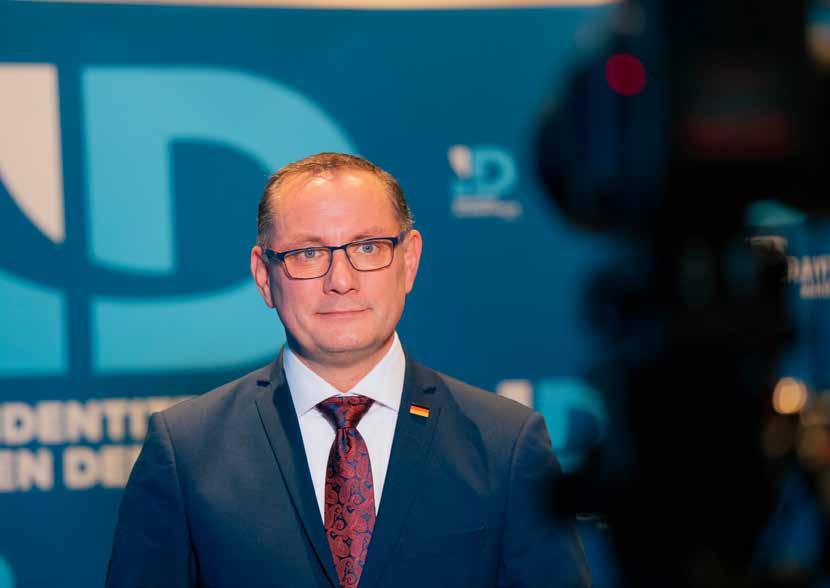
policy. The preservation of European culture and its diverse identities is a cornerstone as well. “Unity and strength to the outside world, national diversity within Europe” is what we stand for.
Europe must become a fortress - with secure national and European external borders. Frontex must be developed into a true external border police force - with a mandate for refoulement and repatriation. It is up to the nations themselves to decide their immigration policy. Everyone should live well and safely in their home country, in Germany and Italy as well as in Syria or Afghanistan. This is why we must resume diplomatic relations with these countries.
della protezione efficace dei confini dall’immigrazione illegale e dell’autonomia strategica in materia di politica di sicurezza. La tutela della cultura europea e delle sue varie identità è inoltre un punto cruciale della nostra prospettiva. “L’unità e la forza all’esterno, la diversità nazionale all’interno dell’Europa”, ecco che cosa difendiamo.
“Libertà e sovranità per il
“Freedom and Sovereignty for the Continent of Europe”
The green agenda is endangering our economy: Trade agreements are subjected to ethic values, and supply chains have to be documented for ethic compliance which comes at enormous expense. Homes have to be expensively renovated and retrofitted, the automotive industry is under attack. We demand respect for civilizations and respectful trade on an equal footing.
In the area of mobility, as with energy supply, there should be freedom of choice as we aim for a broad mix of offers. The car is a European invention that we should be proud of. Étienne Lenoir from France invented the internal
L’Europa deve diventare una fortezza: con confini nazionali ed europei sicuri. Frontex deve diventare una forza di polizia vera e propria sui confini, con un mandato di espulsione e di rimpatrio. Spetta alle nazioni stesse decidere in merito alla propria politica sull’immigrazione. Ognuno deve poter vivere bene e in sicurezza nel proprio paese d’origine, in Germania e in Italia come in Siria o in Afghanistan. Ecco perché dobbiamo riprendere le relazioni diplomatiche con questi paesi.
Il patto verde mette in pericolo la nostra economia: gli accordi commerciali sono soggetti a valori etici e le catene di approvvigionamento devono essere documentate per garantire il rispetto dell’etica, con conseguenti dispendi enormi. Gli edifici devono essere ristrutturati e modernizzati sostenendo costi esosi ed è sotto attacco anche l’industria automobilistica. Esigiamo rispetto delle culture e un commercio rispettoso sulla base dell’ugua-
combustion engine, German Carl Benz patented his automobile fueled by gas. Italians have developed the fastest engines and the most beautiful car bodies.
Our companies have helped millions of people achieve happiness and prosperity - through competition and cooperation. However, the EU wants to destroy those accomplishments. The EU decided to ban combustion engines taking effect in 2035. The EU emission standard 7 will come into force as early as 2025. It is meant to reduce NOx emissions but will increase production costs, and. Ordinary people will soon no longer be able to afford a car to commute to work or to pick up their children.
We must stop the war against the car. Individual transport means freedom!
Today, the EU stands for green coercion and the destruction of prosperity. The EU endangers the identity of nations. We want a Europe of identity and social peace, a Europe of cooperation across the continent. This is our vision for an alternative Europe.
glianza.
Nel settore della mobilità come in quello dell’approvvigionamento energetico, la libertà di scelta deve essere garantita, perché ci si presenta un ampio ventaglio d’offerte. L’automobile è un’invenzione europea di cui possiamo essere orgogliosi. Il francese Étienne Lenoir ha inventato il motore a combustione interna, mentre il tedesco Carl Benz ha brevettato la sua automobile a gas. Gli italiani hanno messo a punto i motori più veloci e le più belle carrozzerie.
Le nostre aziende hanno aiutato milioni di persone a raggiungere la felicità e la prosperità, grazie alla concorrenza e alla collaborazione. Tuttavia, l’Unione europea intende distruggere questi risultati. L’UE ha deciso di vietare i motori a combustione a partire dal 2035. Il regolamento Euro 7 dell’UE entrerà in vigore dal 2025. Dovrebbe servire a ridurre le emissioni di NOx, invece aumenterà i costi di produzione e quelli di utilizzo. La gente normale presto non avrà più soldi per comprare un’auto per andare al lavoro o andare a prendere i figli. Dobbiamo porre fine alla guerra contro l’automobile. Il trasporto individuale è sinonimo di libertà!
Oggi, l’UE è sinonimo di coercizione verde e distruzione della prosperità. L’UE mette in pericolo l’identità delle nazioni. Noi vogliamo un’Europa dell’identità e della pace sociale, un’Europa della collaborazione attraverso l’intero continente. Ecco qual è la nostra visione di un’Europa alternativa.




In five years, the European federalists have pushed ahead with their agenda without consulting the citizens of the Member States regarding the loss of their sovereignty. Some issues have left their mark more than others.
The Migration Pact is Europe’s promise to impose yet more immigration on us. Ever since the Marrakesh Pact was foisted on the people, the European Commission has been working in the greatest secrecy on its Migra-
In 5 anni, i federalisti europei avranno portato avanti il loro programma senza che i cittadini degli Stati membri siano stati consultati sulla sparizione della loro sovranità. Alcune questioni avranno lasciato il segno più di altre.
Il patto sulla migrazione è la promessa europea di imporci sempre più immigrazione. In seguito all’imposizione ai popoli del Patto di Marrakech, la Commissione europea ha lavorato al Patto sulla Migrazione e sull’Asilo con

tion and Asylum Pact, out of sight of the people who will have to live with it. Under the pretext of “improving the security of migrants”, the Pact will create the legal, logistical and political conditions for the mass movement and settlement of people, mainly from the Third World, on the European continent.
The multicultural model is imposing itself at the highest level of Europe-
la massima segretezza, all’insaputa dei popoli ai quali sarà imposto. Con il pretesto di “migliorare la sicurezza dei migranti”, questo patto creerà le condizioni giuridiche, logistiche e politiche per l’instradamento e l’insediamento massivo nel continente europeo di popolazioni provenienti in particolare dal terzo mondo.
Il modello multiculturale si impone ai massimi vertici delle istituzioni euro-
an institutions. The European Union recently launched a campaign to encourage young people to vote, featuring a veiled woman at the centre of its illustration. This is not the first time this has been done. A Council of Europe campaign, supported and co-financed by the EU, bore the slogan: “Freedom is in the hijab”.
Nobody in Europe has heard of the Conference on the Future of Europe. Although it was open to all, only a few thousand out of 500 million Europeans took part. Yet the themes were major ones: climate change and the environment, health, a stronger economy, social justice and employment, the EU in the world, values and rights, the rule of law and security, digital transformation, European democracy, migration, education, culture, youth and sport. The CoFE’s plenary debates were cataclysmic, both in terms of their poor organisation and the content of their conclusions.
This did not prevent the European Union from drawing conclusions in favour of “more Europe”, denounced by the ID Party members who took an active part in it: Hélène Laporte (France), Catherine Griset (France), Philippe Olivier (France), Mara Bizzotto (Italy), Alessandro Panza (Italy), Susanna Ceccardi (Italy), Gerolf Annemans (Flanders), Jaak Madison (Estonia), and Petra Steger (Austria).
In the autumn of 2023, at the end of the term of office, a report by the whimsical Flemish Liberal Guy Verhofstadt (Renew), voted through by the European Parliament, advocated the grad-
pee. L’Unione europea ha lanciato di recente una campagna affinché i giovani vadano al voto il 9 giugno, proponendo come immagine chiave quella di una donna velata. E non è la prima volta. Una campagna del Consiglio d’Europa, sostenuta e cofinanziata dall’UE, aveva per slogan: “La libertà è nel hijab”.
Nessuno, in Europa, ha sentito parlare della Conferenza sul Futuro dell’Europa. Pur essendo aperta a tutti, solo qualche migliaio di cittadini su 500 milioni di Europei vi ha partecipato. Eppure le tematiche erano importanti: cambiamento climatico e ambiente, sanità, economia più forte, giustizia sociale e impiego, l’UE nel mondo, valori e diritti, stato di diritto e sicurezza, trasformazione digitale, democrazia europea, migrazione, istruzione, cultura, gioventù e sport.
I dibattiti tenutisi in assemblea plenaria della COFE sono stati disastrosi, sia se pensiamo all’organizzazione carente sia per quanto concerne il contenuto delle conclusioni.
Ciò non ha impedito all’Unione europea di tirare somme orientate al concetto di “niente più Europa”, come segnalato dai membri del partito ID che hanno partecipato attivamente: Hélène Laporte (Francia), Catherine Griset (Francia), Philippe Olivier (Francia), Mara Bizzotto (Italia), Alessandro Panza (Italia), Susanna Ceccardi (Italia), Gerolf Annemans (Fiandre), Jaak Madison (Estonia), Petra Steger (Austria).
Nell’autunno del 2023, alla fine della legislatura, un rapporto presentato

ual stripping away of national sovereignty of States and the geographical enlargement of the European Union (as far as Ukraine and the countries of the Western Balkans).
The European Green Deal is a set of measures taken by the European Commission to make Europe climate-neutral, with the aim of reducing greenhouse gas emissions. While the goal of reducing Europe’s carbon footprint is commendable, it is yet another imposition by the European Union on the Member States. Above all, it paves the way for punitive ecology, which will result in the impoverishment of Europeans.
dallo stravagante liberale fiammingo Guy Verhofstadt (Renew) e votato dal Parlamento europeo, si orientava verso una riduzione progressiva della sovranità degli Stati e l’ampliamento geografico dell’Unione europea (fino all’Ucraina e ai paesi dei Balcani occidentali). Ci vorrà una sulla revisione dei trattati.
Il Green Deal europeo è il complesso delle misure prese dalla Commissione europea per rendere l’Europa climaticamente neutra, pertanto è volto a ridurre le emissioni di gas a effetto serra entro il 2050. Se l’obiettivo di ridurre le emissioni di anidride carbonica è lodevole, siamo tuttavia di fronte a una nuova imposizione dell’Unione europea sugli Stati membri. Soprattutto, lascia la porta aperta all’ecologia punitiva che avrà come conseguenza l’impoverimento degli europei.
The European Union, so remote and so complicated: the ID Party wants to make it simpler and restore power to the people!
For most citizens, the workings and institutions of the European Union seem very vague, which we believe just goes to show that it does not meet some of the requirements of democratic life: simplicity, representativity and democracy. In just a few lines we would like to take this opportunity to introduce you to the seven main institutions.
The European Council is made up of the heads of State and government of the European Union. It is led by a President, currently the Belgian Charles Michel, who is responsible for negotiating compromises. Its object is to define the main lines of European policy, for which it meets four times a year.
The main role of the European Commission is to propose legislation and oversee the application of community policies. Although it is an essential cog in the wheel, it nevertheless suffers from a lack of democracy, since the Commissioners (one per Member State, twenty-seven in total) are not directly elected by the citizens, but proposed by the heads of State and government prior to being validated by the Parliament. Established in 1957 by the Treaty of Rome, the Commission
L’Unione europea, così lontana e così complicata: il partito ID vuole semplificare e ridare il potere al popolo!
Per la maggior parte dei cittadini il funzionamento e le istituzioni dell’Unione europea sembrano piuttosto oscuri, prova, secondo noi, che essa non soddisfa le esigenze della vita democratica: semplicità, rappresentatività, democrazia. Ora vogliamo prenderci il tempo di presentarvi, in qualche riga, le sette istituzioni principali.
Il Consiglio europeo riunisce i capi di Stato e di governo dell’Unione europea. È diretto da un presidente, attualmente il belga Charles Michel, che ha il compito di agevolare i compromessi. Il suo obiettivo è definire i grandi assi della politica europea e si riunisce quattro volte all’anno.
Il ruolo principale della Commissione europea è proporre testi e monitorare l’applicazione delle politiche comunitarie. Ingranaggio fondamentale, anch’essa soffre di una certa carenza di democrazia, poiché i commissari (uno per ogni Stato membro, ventisette in tutto) non sono eletti direttamente dai cittadini, ma vengono proposti dai capi di Stato e di governo, per essere in seguito convalidati dal Parlamento. Istituita nel 1957 con il trattato di Roma, è oggi diretta da Ursula von der Leyen.
European Parliament in Strasbourg
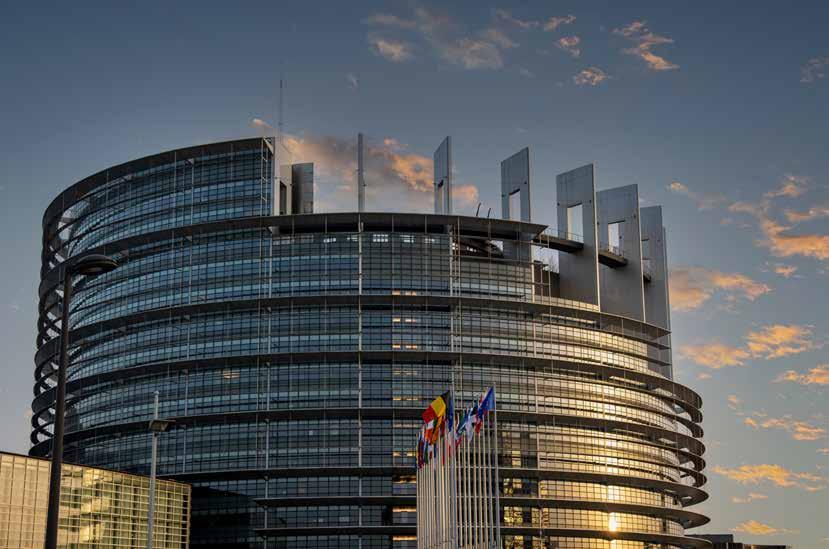
is currently headed by Ursula von der Leyen.
The Council of the European Union is the body that unites the ministers responsible for the issues under discussion (ministers of the interior, finance, etc.). It adopts European legislation with the Parliament on the basis of proposals made by the European Commission, approves (again with the Parliament) the European Union’s annual budget, formulates the common foreign and the security policy.
The European Parliament shares the prerogatives of the legislative power with the Council of the European Union. Since 1979, it has been elected by direct universal suffrage under the proportional representation system (including in countries accus-
Il Consiglio dell’Unione europea è l’organo che riunisce i ministri incaricati delle questioni trattate (ministro degli Interni, delle Finanze e così via). Adotta la legislazione europea con il Parlamento su proposta della Commissione europea, convalida (sempre con il Parlamento) il budget annuale dell’Unione europea, elabora la politica estera e di sicurezza comune.
Il Parlamento europeo condivide con il Consiglio dell’Unione europea le prerogative attribuite al potere legislativo. Dal 1979, è eletto a suffragio universale con il metodo dello scrutinio proporzionale (anche nei paesi in cui lo scrutinio si svolge normalmente con il metodo maggioritario); in questo modo, si garantisce una rappresentazione talvolta più precisa rispetto a quella delle assemblee nazionali. La
tomed to election on a majority basis), which guarantees a representation that is sometimes fairer than in national assemblies. The official seat of the European Parliament is in Strasbourg, where plenary sessions are held, while committee meetings are generally held in Brussels. To facilitate parliamentary work, the elected members of the national parties are divided into groups.
The Court of Justice of the European Union ensures that European law is applied properly in all Member States. It also has jurisdiction to interpret European law at the request of judges working in the various countries. It can be called upon by both the Commission and the States to assess whether or not a Member State has breached European law.
The Frankfurt-based European Central Bank defines the thrust of monetary policy and its single currency, the euro. One of the Central Bank’s top priorities since its creation has been price stability, and therefore the fight against inflation.
The Court of Auditors is responsible for analyzing the revenue and expenditure of the European Union, this external body theoretically introduces independent expertise into the management of the accounts of the institutions.
sede ufficiale del Parlamento europeo si trova a Strasburgo, dove si tengono le assemblee plenarie, mentre le commissioni si riuniscono generalmente a Bruxelles. Al fine di agevolare il lavoro parlamentare, gli eletti dei partiti nazionali si riuniscono in gruppi.
La Corte di Giustizia dell’Unione europea si accerta che l’applicazione del diritto europeo sia conforme in tutti gli Stati membri. È inoltre di sua competenza l’interpretazione del diritto europeo su richiesta dei giudici che operano nei vari paesi. Può essere interpellata sia dalla Commissione sia dagli Stati, per valutare eventuali violazioni del diritto europeo da parte di uno Stato membro.
Situata a Francoforte, la Banca centrale europea definisce gli assi della politica monetaria e della moneta unica, ovvero l’euro. Una delle massime priorità della Banca centrale, da quando è stata creata, è la stabilità dei prezzi e quindi la lotta contro l’inflazione.
Alla Corte dei conti spetta la competenza dell’analisi dei gettiti e delle spese dell’Unione europea; quest’organo esterno consente infatti, in teoria, una perizia indipendente sulla gestione dei conti delle istituzioni.
The majority in the European Parliament is often described as a grand coalition between the centre-right European People’s Party (EPP) and the Socialists and Democrats (S&D), from centre-left to left. What has long held true may gradually become less so. A victory for the patriotic and conservative parties could indeed reshuffle the cards.
The continuing rise of parties belonging to both the Identity and Democracy group and the European Conservatives and Reformists will make them increasingly unavoidable in the Chamber. Occasional or more established alliances between political formations ranging from the centre-right, with the Christian Democrats in particular, to patriotic parties, could thus become a mathematical possibility.
What’s more, the left’s increasingly assertive ecological and ‘immigrationist’ delusions and its inability to defend our common identity, opting instead for wokery and cancel culture, are making it increasingly unacceptable, including to centre-right parties.
Finally, the accession to power of a growing number of parties belonging to our political sphere places them at the centre of the game and of negotiations. In any case, they are proving increasingly difficult to exclude and ignore.
La maggioranza al Parlamento europeo si riassume spesso come una grande coalizione, che associa il Partito popolare europeo (PPE), di centro destra, ai socialisti e ai socialdemocratici (S&D), che vanno dal centrosinistra alla sinistra. Ciò che per tanto tempo è stato verità potrebbe esserlo sempre meno. Una vittoria dei partiti patrioti e conservatori potrebbe di fatto rimescolare le carte.
La spinta costante dei partiti appartenenti sia alla famiglia di Identità e Democrazia sia a quella dei Conservatori e Riformisti europei renderà queste fazioni sempre più imprescindibili nel contesto dell’emiciclo. Potrebbero perciò diventare matematicamente possibili alleanze specifiche o più solide fra le formazioni politiche che vanno dal centrodestra, in particolare con i cristiano-democratici, ai patrioti.
D’altronde, il delirio sempre più ribadito dalla sinistra in materia di ecologia e immigrazione, nonché l’incapacità di difendere la nostra identità comune, preferendo invece il wokismo e la cancel culture, rendono questo ambiente sempre meno frequentabile, anche per i partiti di centrodestra.
Infine, l’arrivo al potere di un numero sempre maggiore di partiti appartenenti alla nostra sfera politica colloca questi ultimi al centro del gioco e delle negoziazioni. E, in ogni caso, è sempre più difficile escluderli e ignorarli.


From Lampedusa to our villages, the consequences of immigration gone mad
The pictures are chilling: on this day in September 2023, several thousands of men and women (although in the minority) land on the small Italian island of Lampedusa (20 km2, and just over 6,000 inhabitants). The island has become a symbol of the unbridled immigration encouraged by the European Union.
Several thousand kilometres away, in
Da Lampedusa alle nostre città, le conseguenze di un’immigrazione ormai fuori controllo
Le immagini fanno venire i brividi alla schiena: in questo giorno di settembre 2023, diverse migliaia di uomini e donne (seppure queste ultime siano in numero minore) sbarcano nella piccola isola italiana di Lampedusa (20 km2, poco più di 6.000 abitanti). Questo posto è diventato il simbolo dell’immigrazione incontrollata voluta dall’Unione europea.
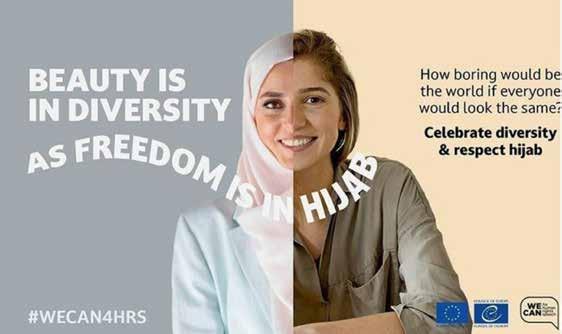
The European Union’s campaign
the neighbourhoods of major cities and even in the most remote villages, the cascading consequences of this suicidal policy are visible and directly borne by local populations: in Sweden, a country hitherto known for its peace and quiet, the number of rapes and assaults has increased since the country opened its borders; in France, the settling of scores between cultural and ethnic groups is on the increase, and we recently witnessed the murder of a teacher three years after that of Samuel Paty, whose throat was slit as a result of showing his students cartoons featuring the prophet Mohammed. And we have not forgotten the gang rapes of young German women on New Year’s Eve in Cologne.
Yet the leaders of the European Union are forever repeating their mantra that immigration is a good thing! But the European Commission has shaped its Migration and Asylum Pact, one of its major legislative achievements, out
A diverse migliaia di chilometri di distanza, nei quartieri delle grandi città fino ai centri abitati più reconditi, le conseguenze derivanti da questa politica suicida sono visibili e direttamente a carico della popolazione nativa: in Svezia, paese noto fino ad allora per la sua tranquillità, il numero di stupri e aggressioni è aumentato dal momento dell’apertura del paese; in Francia, i regolamenti di conti tra gruppi culturali ed etnici si moltiplicano e, recentemente, è stato anche ucciso un professore, tre anni dopo Samuel Paty, sgozzato per aver mostrato alcune caricature di Maometto; senza dimenticare lo stupro collettivo di alcune giovani tedesche durante i festeggiamenti di Capodanno a Colonia.
Eppure, i dirigenti dell’Unione europea non smettono di ripetere il loro mantra: secondo loro, l’immigrazione sarebbe un beneficio! Ed è in ogni caso dietro le quinte che la Commissione europea ha modellato il suo Patto sulla
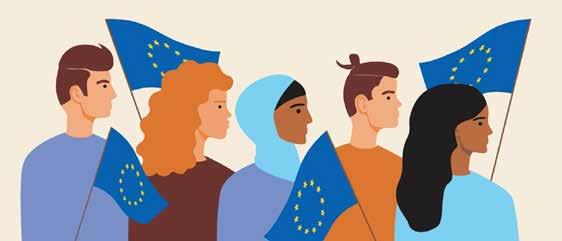
The European Union’s campaign depicting a veiled woman
of sight. At its launch, Ursula von der Leyen did not hesitate to declare that “migration has always been a reality in Europe” and that it “will continue to be so”. We have been forewarned
Under the pretext of “improving the safety of migrants”, the EU’s Migration and Asylum Pact aims to create the legal, logistical and political conditions for the mass movement and settlement of people, mainly from Third World countries, on the European continent. At the same time, Europe’s borders are left unguarded. Ylva Johansson, the European Commissioner for Home Affairs, was forced to concede that 22% of people entering Europe are not subject to checks. And yet, going against every shred of common sense, she is fond of repeating that “we need immigration”.
At the very heart of the migration
Migrazione e sull’Asilo, una delle sue grandi realizzazioni in ambito legislativo. Al momento del lancio, Ursula von der Leyen non ha esitato a dichiarare che la “migrazione è sempre stata una realtà in Europa” e che “continuerà a esserlo”. Quindi siamo stati avvertiti.
Con il pretesto di “migliorare la sicurezza dei migranti”, il Patto sulla Migrazione e sull’Asilo dell’UE ha l’obiettivo di creare le condizioni giuridiche, logistiche e politiche per l’instradamento e l’insediamento massivo nel continente europeo di popolazioni provenienti in particolare dal terzo mondo. Al contempo, i confini europei non sono custoditi. La Commissaria europea per gli affari interni Ylva Johansson ha dovuto ammettere che il 22 % delle persone che entrano nello spazio europeo non è controllato. Eppure non cessa di ripetere, contro ogni buon senso: “Noi
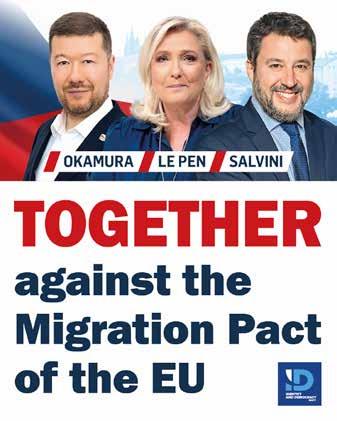
The ID Party campaign against the Migration Pact
policy, the distribution of migrants is currently fraught with problems, as it obliges countries to relocate a certain quota of migrants within their borders, with figures being redefined every year. Countries that refuse to take their share are required to pay €20,000 for each migrant they reject... at the taxpayer’s expense.
For the Identity and Democracy Party, all this is clearly unacceptable and mass immigration must be opposed, failing which the situation will become untenable throughout the European Union.
abbiamo bisogno dell’immigrazione”.
Tema cruciale della politica migratoria, la ripartizione dei migranti è oggi problematica, perché obbliga i paesi a ricollocare nei propri territori una quota di migranti ridefinita ogni anno. I paesi che rifiutano di accettare la propria parte devono pagare 20.000 per ogni migrante rifiutato. A carico del contribuente.
Per il partito Identità e Democrazia, tutto questo è chiaramente inaccettabile e l’immigrazione di massa deve essere combattuta, altrimenti la situazione diventerà insostenibile, ovunque nel territorio dell’Unione europea.
Much has been written about the Migration Pact. It is supposed to enable us to strengthen and better control our borders. Nothing could be further from the truth, which is why we are taking the gamble of summarising its current content.
- Illegal immigration will be replaced by irregular immigration. As a result, people who enter the country illegally will no longer be subject to criminal penalties.
- The definition of «family members» has been broadened. In addition, Member States must inform migrants of the possibilities for family reunification.
- Member States may be obliged to accept refugees, the number being set by the Commission.
- Member States must pay €20,000 for each asylum seeker not admitted.
- The European Parliament wants integration requirements to be relaxed.
- «Talent Attraction Partnerships” should fill the labour gap in the EU through agreements with non-EU countries such as Egypt, Tunisia and Morocco. Later, the aim is also to integrate Senegal, Nigeria, Pakistan and Bangladesh.
With this plan, the EU wants to legalise illegal immigration. The aim is to replace European workers with non-Eu-
Che cosa c’è davvero nel Patto sulle migrazioni dell’Unione europea?
Il Patto sulle migrazioni ha fatto scrivere molto su di sé. Dovrebbe consentirci di rafforzare e controllare meglio le nostre frontiere. Ma non c’è niente di più falso, ecco perché ci prendiamo la briga di riassumerne il contenuto attuale.
- L’immigrazione illegale sarà sostituita dall’immigrazione irregolare. Di conseguenza, le persone che entrano illegalmente nel territorio non possono più essere oggetto di sanzioni penali.
- Si è ampliata la definizione di “membri della famiglia”. Inoltre gli Stati membri devono informare i migranti in merito alle possibilità di ricongiungimento familiare.
- Gli Stati membri possono essere costretti ad accogliere rifugiati nella misura stabilita dalla Commissione.
- Gli Stati membri devono pagare 20.000 euro per ogni richiedente non accolto.
- Il Parlamento europeo intende semplificare i requisiti in materia di integrazione.
- Le “partnership volte ad attirare risorse” dovranno colmare la carenza di manodopera nell’Unione europea mediante accordi con paesi non europei come l’Egitto, la Tunisia e il Marocco. Successivamente, lo scopo sarebbe di integrare anche il Senegal, la Nigeria, il Pakistan e il Bangladesh.
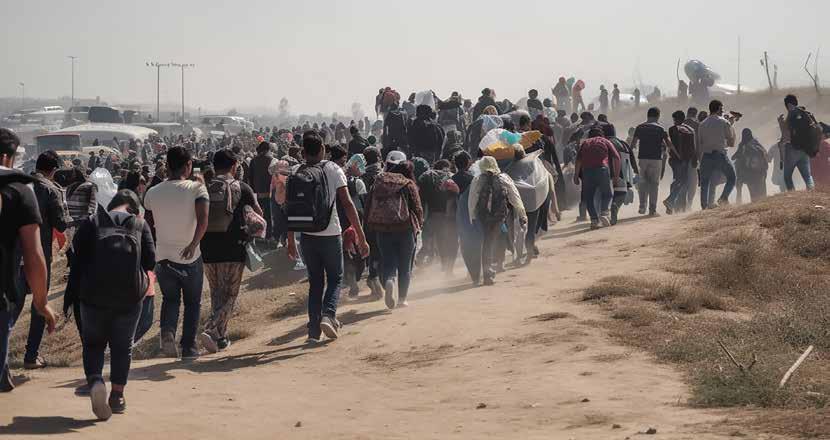
ropeans. Millions of people will thus be able to come to Europe legally.
The EU’s migration pact is a diabolical pact that undermines the sovereignty of the Member States. It threatens our security, our identity and our prosperity. Our Identity and Democracy party opposes this suicidal pact with all its might. To this end, our MEPs have also fought it through numerous amendments.
We do not want mass migration, but a halt to migration. We do not want asylum seekers to be dispersed; we want illegal immigrants to be returned to their countries of origin. We do not want compulsory solidarity, but an end to European asylum policy. We do not want open borders, but a fortress Europe.
Con questo programma l’UE intende pertanto legalizzare l’immigrazione illegale. L’obiettivo è sostituire i lavoratori europei con elementi non-europei. Milioni di persone potranno così recarsi legalmente in Europa.
Il patto migratorio dell’UE è un patto diabolico che mina la sovranità degli Stati membri. Minaccia la nostra sicurezza, la nostra identità e la nostra prosperità. Il nostro partito Identità e Democrazia si oppone con tutte le proprie forze a questo patto suicida. In tal senso, anche i nostri eurodeputati lo hanno contrastato mediante vari emendamenti.
Noi non vogliamo una migrazione di massa, bensì che le migrazioni si fermino. Noi non vogliamo una dispersione dei richiedenti asilo, bensì il ritorno dei clandestini nei loro paesi d’origine. Noi non vogliamo una solidarietà obbligatoria, bensì uscire dalla politica europea sull’asilo. Noi non vogliamo frontiere aperte, ma un’Europa-fortezza.
The European Border and Coast Guard Agency, better known as Frontex, is the focus of much attention. Although it has existed since 2004, it has only been known in its current form since 2016 in the wake of an unprecedented migration crisis. As its name suggests, its purpose is to monitor the external borders of the Schengen area.
Although it was not initially equipped to carry out border management operations, it was given new operational powers and equipped with a European corps of border guards and coast guards. The budget allocated to the agency continues to grow, from €238 million in 2016 to €750 million in 2022.
Pro-migrant NGOs and some of the media were quick to target Frontex, accusing it of violating human rights. The agency was accused of... turning back migrants trying to enter Greece from Turkey. Among ‘immigrationists’, any excuse is used to undermine the very mission of the agency.
Its French director Fabrice Leggeri was ousted in 2022 and replaced by the Dutchman Hans Leijtens. Frontex now seems to have lost the purpose of its mission: restoring Frontex to its role of guarding increasingly threatened borders and coastlines is vital.
L’agenzia europea delle guardie di frontiera e dei guardacoste, meglio conosciuta come Frontex, è al centro di tutte le attenzioni. In essere dal 2004, ma conosciuta nella sua forma attuale dal 2016, sulla scia di una crisi migratoria senza precedenti, ha lo scopo, come dice il nome, di controllare le frontiere esterne dello spazio-Schengen.
Se inizialmente non era armata, bensì doveva occuparsi solo di operazioni di gestione delle frontiere, da allora le sono state attribuite nuove competenze operative ed è stata dotata di un corpo europeo di guardie di frontiera e guardacoste. Il budget ad essa allocato continua, dal canto suo, ad aumentare, passando da 238 milioni di euro nel 2016 a 750 milioni nel 2022.
Senza farsi attendere, alcune ong pro-migranti e certi media hanno preso di mira Frontex, accusandola di violare i diritti umani. L’agenzia è stata così accusata di aver... espulso migranti che tentavano di entrare nel territorio greco dalla Turchia. Nell’ottica degli immigrazionisti, ogni tentativo è buono per annientare la missione dell’agenzia.
Il suo direttore francese Fabrice Leggeri fu allontanato nel 2022 e sostituito dall’olandese Hans Leijtens. Frontex sembra ormai aver perso il senso della sua missione: restituire a Frontex la sua vocazione di custodire le frontiere e le coste, sempre più minacciate, è una necessità.



At one of its conferences held in Tallinn, the Estonian capital, in November 2022, the Identity and Democracy Party asked a somewhat provocative question regarding the European Union’s energy policies, namely “is green the new red?”
In other words, it is important to ask whether we are witnessing the emergence of a totalitarianism dictated by the need to save the planet, which has become the new leitmotiv of the ruling classes.
The European Green Deal aims to reduce CO2 emissions by 50% by
In occasione di una delle sue conferenze tenutasi a Tallinn, la capitale dell’Estonia, a novembre 2022, il partito Identità e Democrazia si interrogava in merito alle politiche energetiche condotte dall’Unione europea, ponendo una domanda un po’ provocatoria: il verde è il nuovo rosso?
In altre parole, è importante chiedersi se si stia assistendo alla nascita di un totalitarismo dettato dalla necessità di salvare il pianeta ed è questo il nuovo leitmotiv delle classi dirigenti.
Il Patto verde europeo, o Green deal, intende ridurre le emissioni di CO2 del
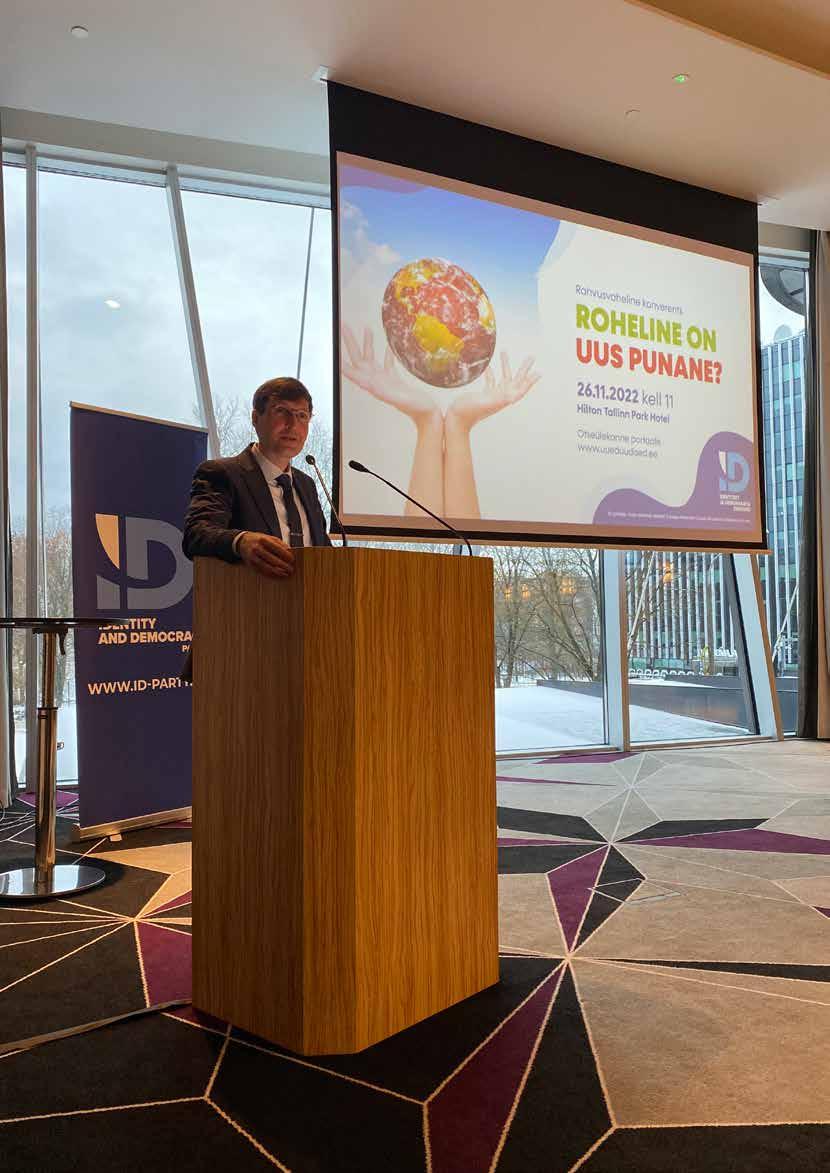
Martin Helme, EKRE, alla conferenza del partito ID a Tallinn, sul Green Deal
Martin Helme, EKRE, at the ID Party conference on the Green Deal in Tallinn
2030, compared with 1990 levels, and to achieve carbon neutrality by the middle of the century. The objective may seem noble, since it is based on a desire to develop the circular economy that relies on local traders, craftsmen and entrepreneurs.
Although the objective itself is a noble one, European climate policy is also paving the way for taxation that will affect the lowest incomes, and for the introduction of measures that will force citizens to change their habits, even when they can’t afford to do so. They will sometimes be obliged to change their vehicles (the death of the internal combustion engine is already programmed) or to renovate their homes at exorbitant cost. Small and medium-sized businesses will also be affected by the inflation that will inevitably result from the implementation of the Green Deal.
This is how the mechanisms of punitive ecology are implemented. Yet there is another form of ecology based on proximity and the importance of promoting local products, local traders and local craftsmen.
50 % entro il 2030 rispetto ai numeri del 1990, raggiungendo la soglia delle emissioni zero per la metà del secolo. L’obiettivo può sembrare nobile, perché si basa sulla volontà di sviluppare l’economia circolare, basata pertanto sui commercianti, gli artigiani e gli imprenditori locali.
Se l’obiettivo è nobile, la politica europea sul clima porterà una tassazione che toccherà anche i redditi più bassi, comportando l’attuazione di provvedimenti che costringeranno i cittadini a cambiare le proprie abitudini pur non avendo i mezzi per farlo. Saranno talvolta costretti a cambiare l’automobile (è stata infatti pianificata la dismissione del motore a combustione) oppure a ristrutturare le proprie abitazioni a prezzi esorbitanti. Le piccole e medie imprese saranno altrettanto toccate dall’inflazione che sarà inevitabilmente generata dall’attuazione del Green Deal.
È così che saranno implementati i meccanismi dell›ecologia punitiva. In alternativa, esiste un›altra ecologia, basata sulla prossimità e sull›importanza di promuovere i prodotti del territorio, supportando i commercianti di prossimità e gli artigiani locali.
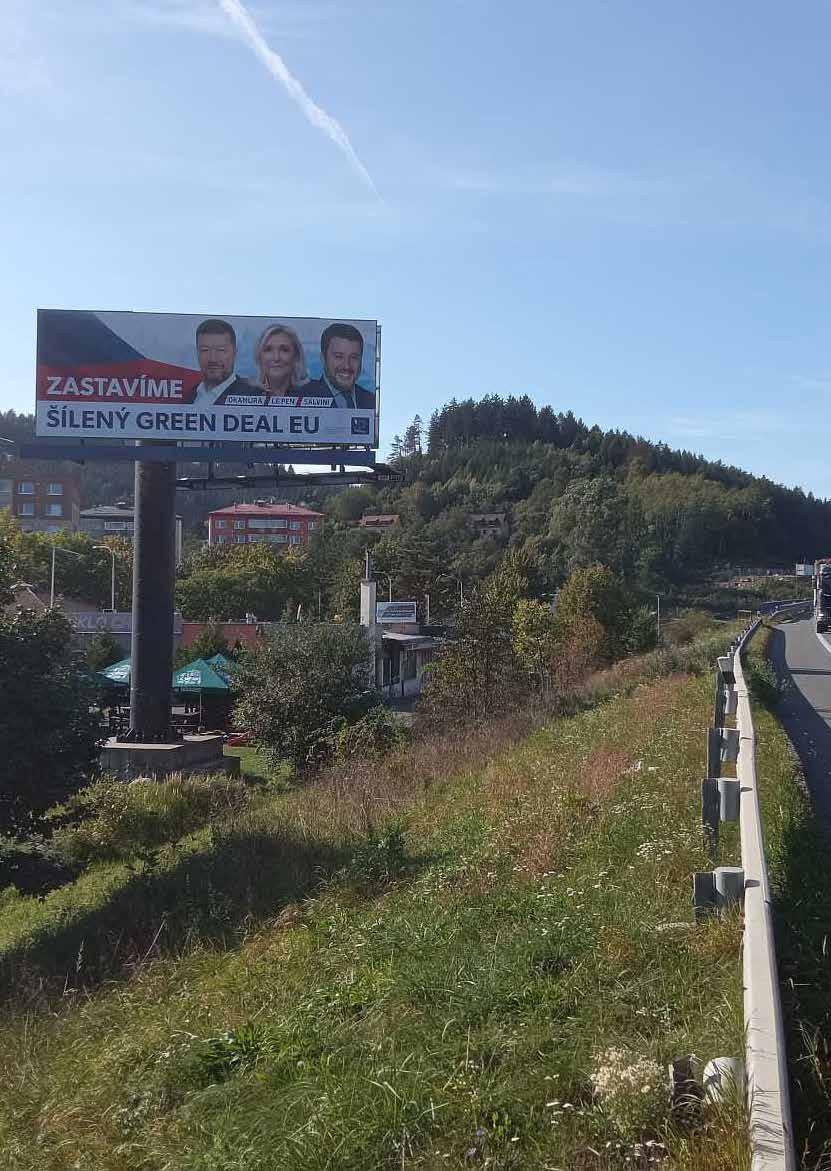
The ID Party’s campaign against the Green Deal
Farmers throughout the European Union have expressed their discontent on a number of occasions in recent months. They are the first to suffer as a result of policies pursued at European level and, in some cases, excessive transposition in matters of national law.
The wave of anger began in the Netherlands in 2019 and has crystallised over the years against a backdrop of policies put in place by Mark Rutte’s Liberal government. It was the policy aimed at reducing nitrogen emissions that lit the fuse and, more specifically, in order to achieve the objectives, the law aimed at restricting the number of animals on farms. Sporting red scarves, the “boeren” (farmers) were supported by a large part of the population.
The reason behind this popular support is obvious to everyone, all except Europe’s leaders: farmers are vital. They feed us, they work the land, they shape our landscapes and they provide environmentally-friendly quality products.
Yet today they are rarely taken into account but put in competition with breeders and producers from all over the world because of the free trade agreements signed by European leaders: at the end of 2023, the European Council once again finalised free trade agreements with New Zealand and Chile.
In tutta Europa, gli agricoltori hanno manifestato il proprio disappunto in varie occasioni negli ultimi mesi. Sono proprio loro le prime vittime delle politiche condotte su scala europea e, talvolta, delle eccessive trasposizioni in termini di diritto nazionale.
Questo movimento di collera è iniziato nei Paesi Bassi, nel 2019, e si è cristallizzato nel corso degli anni sullo sfondo delle politiche attuate dal governo liberale di Mark Rutte. È la politica di riduzione delle emissioni di azoto che ha dato fuoco alle polveri, più in particolare la legge volta a limitare il numero di animali negli allevamenti, in funzione degli obiettivi da raggiungere. Con il simbolo del foulard rosso, i “boeri” (contadini) sono stati sostenuti da buona parte della popolazione.
Le ragioni di questo sostegno popolare sono evidenti per tutti... tranne che per i dirigenti europei: gli agricoltori sono indispensabili. Sono loro che ci nutrono, lavorano la terra, danno un volto ai nostri paesaggi e forniscono prodotti di qualità nel rispetto dell’ambiente.
Eppure, al giorno d’oggi, sono raramente considerati. Così si ritrovano in concorrenza con allevatori e produttori dislocati in tutto il mondo, in virtù dei trattati di libero scambio sottoscritti dai dirigenti europei: alla fine del 2023, il Consiglio europeo ha finalizzato accordi addirittura con la
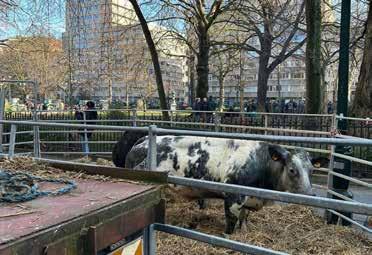
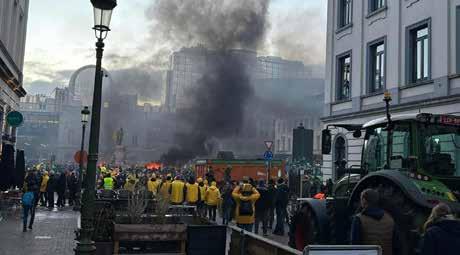
Demonstration of European farmers in Brussels in February 2024
So we now import products that cannot be produced here because of the standards imposed on farmers. There’s no rhyme or reason to any of it, and to illustrate this crazy situation, at the beginning of the year, French farmers turned all town and village name-bearing roadside plaques upside down.
Early in 2024, farmers throughout Europe took to the streets to protest against the measures put in place by the European Union. In front of the European Parliament, thousands of farmers expressed their anger at the fact that they are finding it increasingly difficult to meet their own needs.
You only have to lend an ear to understand the reasons for their anger against the sprawling European Union. They work long hours for an indecent income, are swamped by red tape, and have to comply with more and more standards…
Farmers are now at the very heart of the battle. “Without farmers, there is no country,” said one of their placards at the demonstration in Brussels. To save some is to save others.
Nuova Zelanda e il Cile.Oggi importiamo prodotti che non possono essere prodotti qui, a causa delle norme imposte agli agricoltori. Questo non è buon senso. In segno di protesta, all’inizio dell’anno, alcuni agricoltori francesi hanno capovolto le indicazioni stradali di città e paesi.
All’inizio del 2024, ovunque in Europa, gli agricoltori si sono sollevati contro le misure attuate dall’unione europea. Di fronte al Parlamento europeo, erano a migliaia a manifestare la propria rabbia, spinti dalle crescenti difficoltà a fare fronte alle proprie esigenze.
Basta ascoltare per comprendere i motivi del loro sdegno rispetto a una tentacolare Unione europea. Le ore di lavoro si moltiplicano a fronte di un ritorno indecente, sono sommersi dal lavoro amministrativo, devono integrare norme ogni giorno più numerose...
Oggi, gli agricoltori sono proprio al centro della battaglia. “Sans paysan, pas de pays” (ovvero: “niente contadino, niente paese”), si leggeva su uno dei loro cartelloni, nel giorno della manifestazione a Bruxelles. Salvare il primo significa salvare anche il secondo.
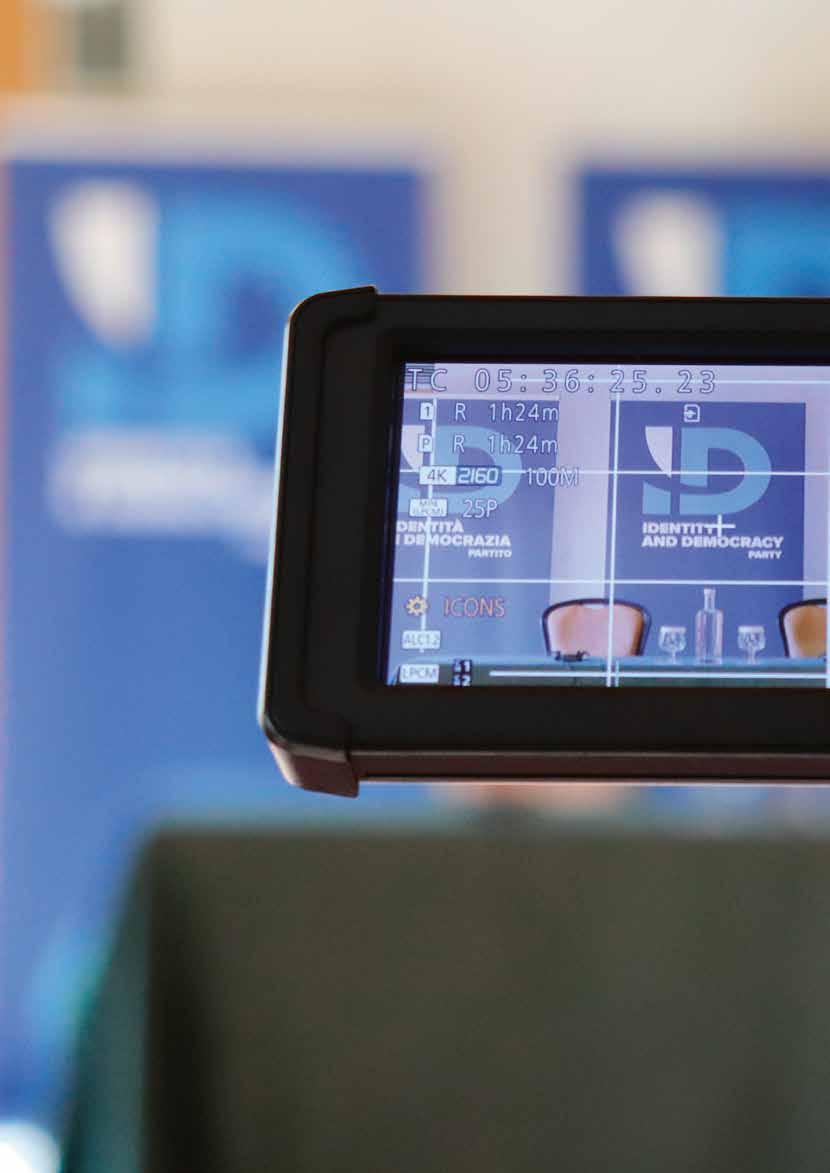
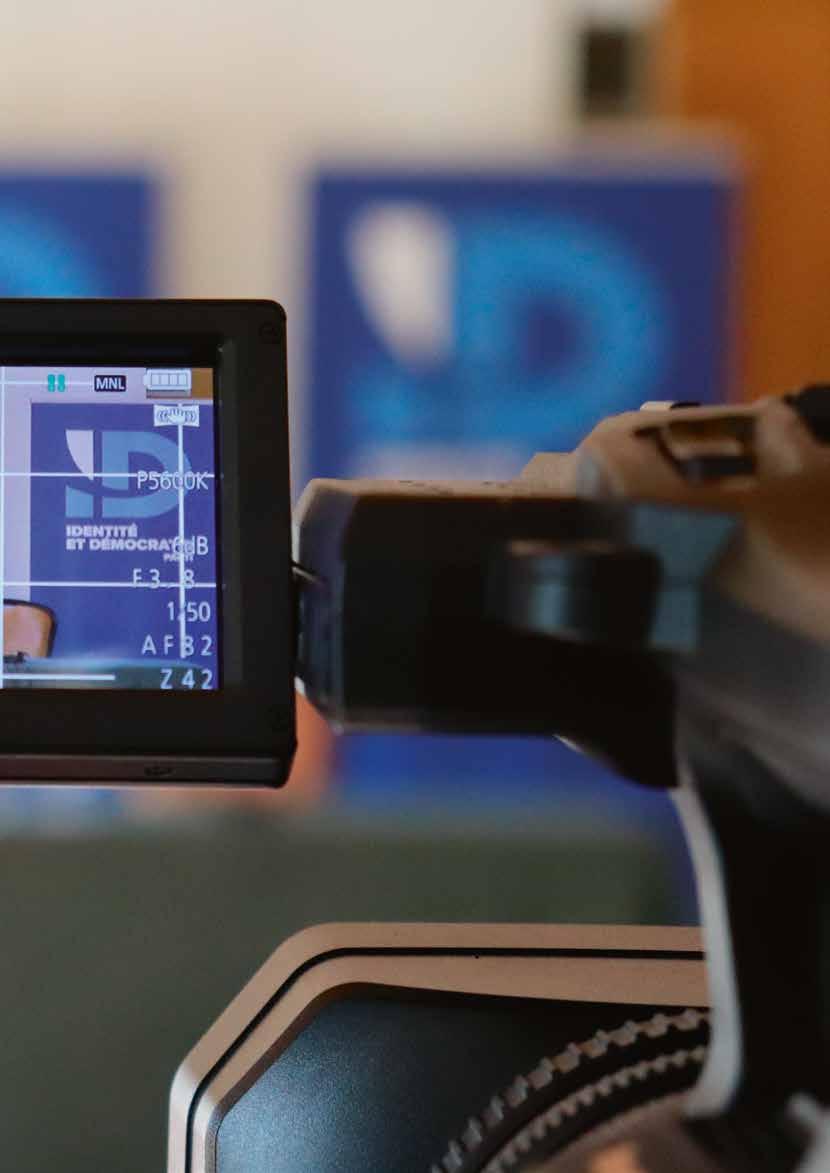
ID Party Congress: working towards a Europe based on cooperation
In Lisbon, in the magnificent setting of the former convent Convento do Beato, André Ventura, President of Chega, did a brilliant job of introducing the European meeting of the Identity and Democracy party entitled “working towards a Europe based on cooperation”: “Times are changing from east to west. Change is underway. We have been chosen to experience a unique period in history (...) We want Europe to be proud to defend its values.” It is indeed true that we are living in a time of great political upheaval that is favourable to patriots.
Harald Vilimsky, a member of the ID Party Bureau, also gave the same optimistic outlook to his speech, and he too sees a radiant future “far from war, and moving towards renewed prosperity, far from globalism and showing real respect for the specific cultural characteristics of each people, far from paternalism and by developing a new way of thinking about freedom!” But he believes there
A Lisbona, nel magnifico contesto dell’ex convento del Beato Antonio, André Ventura, presidente di Chega!, ha introdotto con brio il meeting europeo del partito Identità e Democrazia, il cui argomento era: “Verso un’Europa delle collaborazioni!”: “Da est a ovest, è tempo di cambiamento. Il cambiamento si sta verificando. Siamo stati scelti per vivere un periodo storico unico (...) Noi vogliamo che l’Europa sia un continente fiero di difendere i propri valori.” Certo è che stiamo vivendo in un’epoca di grandi sconvolgimenti politici favorevoli ai patrioti.
Anche Harald Vilimsky, membro del partito ID, Ha tenuto il suo discorso nella stessa giornata di ottimismo e vede, a sua volta, un futuro radioso, “senza guerra e orientato a una nuova prosperità, senza globalizzazione e orientato a un rispetto reale delle peculiarità culturali di ogni singolo popolo, senza paternalismo e orientato a una nuova visione della libertà!”. Ma ritiene che vi sia una condizione:
Marine Le Pen, membro del partito ID, all’Assemblea generale
Marine Le Pen, member of the ID Party bureau, during the General Assembly

is one condition: we must unite and form an ever wider political family.
Unity and respect for our diversity is also the wish of Tomio Okamura, Chairman of the Czech SPD: “As citizens and nations, we are equal, but each person is different, each nation is different and each country has different needs and preferences. It is impossible to mould our peoples into uniform European directives and regulations, because what helps some harms others. Democracy is always built from the bottom up. Each country has, and must have, the right to decide what benefits it wants for itself and its citizens.”
This was also the message from Tino Chrupalla, President of Alternative für Deutschland, who stated with force and conviction that “we intend to defend the values of democracy and respect for identity. We are here to build a new Europe according to our values and our way of life (...). And our strength lies in the fact that we pursue policies that mainly our citizens.”
unirsi e formare una famiglia politica sempre più ampia.
L’unione nel rispetto della diversità è un pensiero che condivide anche Tomio Okamura, presidente ceco di SPD: “In qualità di cittadini e nazioni siamo uguali, ma ogni individuo è diverso, ogni nazione è diversa e ogni paese presenta esigenze e preferenze diverse. Non è possibile integrare i nostri popoli in direttive e regolamentazioni europee uniformi, perché ciò che può far bene agli uni nuoce agli altri La democrazia si costruisce sempre dal basso. Ogni paese ha e deve avere il diritto di decidere in merito ai benefici che apporta a se stesso e ai propri cittadini.”
È la parola d›ordine anche di Tino
Chrupalla, Presidente di Alternative für Deutschland, il quale ha ricordato con forza e convinzione che “noi vogliamo difendere i valori di democrazia e rispetto delle identità. Siamo qui per costruire una nuova Europa, secondo i nostri valori e stili di vita (...).
E siamo sempre più forti, perché con-
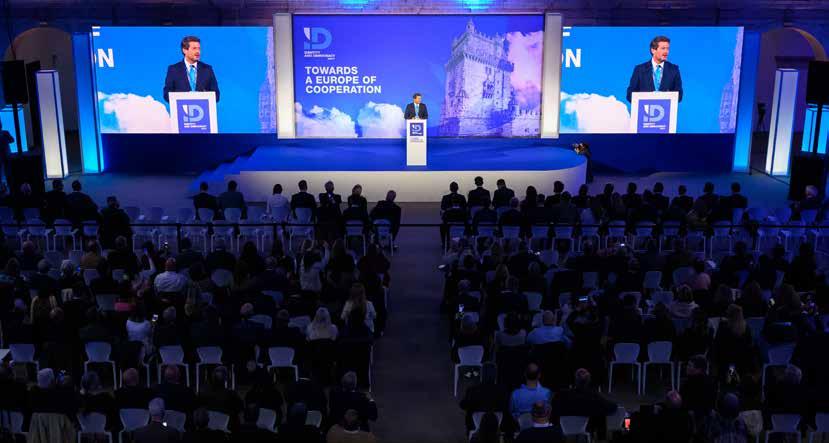
The Estonian Martin Helme, President of EKRE, reminded those present that “we must not let the left and the liberals define the issues. The left prefers to focus on plastic straws and the pay gap between men and women while our countries are being destroyed”.
After paying tribute to Geert Wilders, who had won the Dutch elections just two days earlier, ID Party President Gerolf Annemans was keen to highlight the shortcomings plaguing the European Union: “I don’t know if this translates well, but in Dutch we have a colourful expression which is ‘they’re off to confess to the devil’. This is how we express the idea that victims throw themselves into the arms of the very person who is at the origin of their problems. Confessing to the devil is a terrible mistake, and expecting the EU to solve our problems is equally a mistake.” The Flemish MEP then went on to list a number of problems attributable to the European Union: inflation, energy problems exacerbated by the Green
duciamo politiche rivolte soprattutto ai nostri cittadini”.
L’estone Martin Helme, presidente di EKRE, ha ricordato peraltro che “non dobbiamo permettere alla sinistra e ai liberali di definire le poste in gioco. La sinistra vuole parlare di cannucce di plastica e divario salariale fra uomini e donne, mentre i nostri paesi vanno alla deriva”.
Dopo aver salutato Geert Wilders, che aveva vinto le elezioni nei Paesi Bassi proprio due giorni prima, il presidente del partito ID, Gerolf Annemans, ha voluto ricordare i pesi morti che gravano sull’unione europea: “Non so se sia facile da tradurre, ma in olandese abbiamo un’espressione che rende perfettamente il concetto: “si confesseranno con il diavolo”. Ciò significa che le vittime si gettano fra le braccia di colui che ha causato i loro problemi. Confessarsi con il diavolo è un errore terribile, proprio come aspettarci che l’UE risolva i nostri problemi”. E il deputato europeo fiammingo ha in seguito elencato alcune delle preoc-
Assemblea generale del Partito ID
ID Party General Assembly

Deal, and of course immigration.
Marine Le Pen, the guest of honour and member of the ID Party bureau, who is well placed in the polls for the next presidential election, reminded those present of the close ties between France and Portugal, and spoke of the fight for free nations from a European perspective. But not just any Europe: “Europe will be what we make it. It can be an opportunity for our peoples or a graveyard for our nations. We must be clear about this! I’m not confusing the Europe to which we belong through geography, history and civilisation with the European Union, which is a recent creation, artificial, ideological and out-of-touch. Europe is several thousand years old, whereas the European Union is just 70.”
cupazioni imputabili all’Unione europea: l’inflazione, i problemi energetici aggravati dal Green Deal, e naturalmente anche l’immigrazione.
Invitata d’onore, Marine Le Pen, membro del direttivo del partito ID e ben posizionata nei sondaggi in vista delle prossime edizioni presidenziali, dopo aver ricordato i legami d’amicizia che uniscono i francesi e i portoghesi, ha posto la lotta per la libertà dei popoli in una prospettiva europea. Ma non un’Europa qualunque: “L’Europa sarà ciò che ne faremo noi. Potrebbe essere una possibilità per i nostri popoli, ma anche un cimitero per le nostre nazioni. Cerchiamo di capirci! Non dobbiamo confondere l’Europa alla quale apparteniamo geograficamente, storicamente, culturalmente... con l’Unione europea, che è una creazione recente, artificiale, ideologica ed extraterritoriale. L’Europa è plurimillenaria, mentre l’Unione europea ha solo 70 anni”.
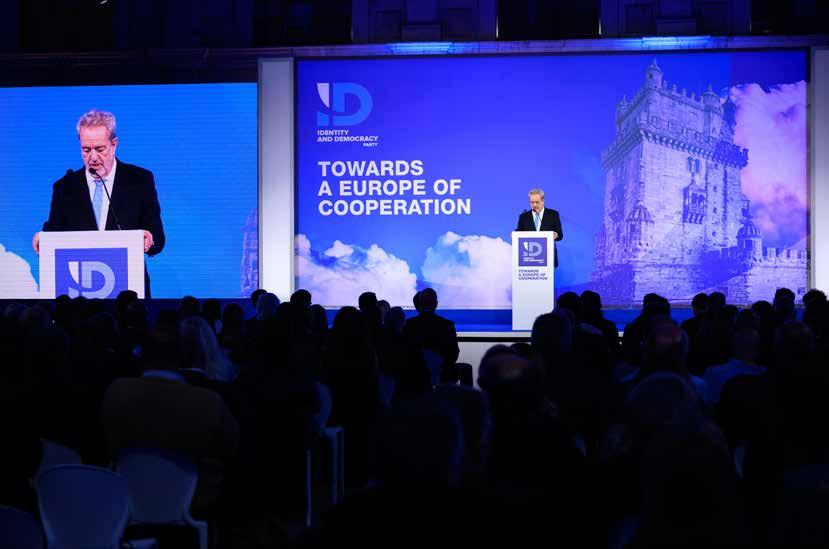
Harald Vilimsky, membro del direttivo del partito ID, Freiheitliche Partei Österreichs
Harald Vilimsky, member of the ID Party Bureau, Freiheitliche Partei Österreichs

Gerolf Annemans, presidente del Partito ID, Vlaams Belang
Gerolf Annemans, President of the ID Party, Vlaams Belang

Marine Le Pen, Ressemblement national, membro del partito ID
Marine Le Pen, Rassemblement National (RN), member of the ID Party Bureau


Martin Helme, presidente di EKRE, membro del partito ID
Martin Helme, President of EKRE, member of the ID Party
Rita Maria Matias, Chega !, membro del partito ID
Rita Maria Matias, Chega, member of the ID Party
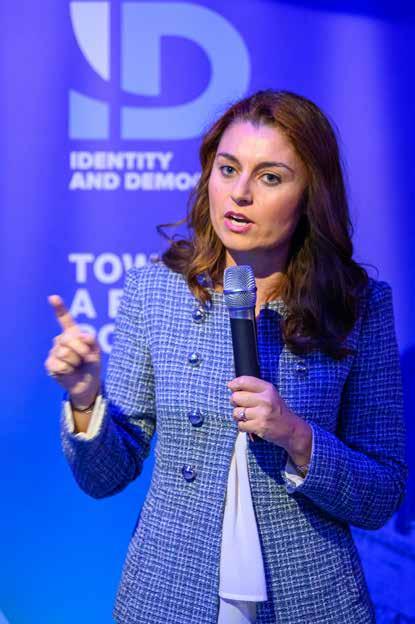
Susanna Ceccardi, membro del Parlamento europeo, Lega, membro del partito ID
Susanna Ceccardi, Member of the European Parliament, Lega, member of the ID Party
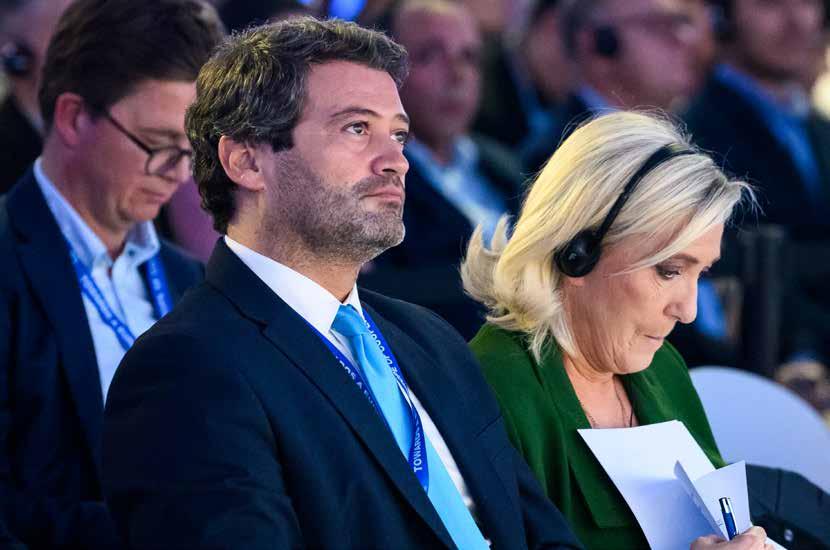
André Ventura, presidente di Chega!, e Marine Le Pen, Ressemblement national, membri del partito ID
André Ventura, president of Chega, and Marine Le Pen, Rassemblement National, members of the ID Party
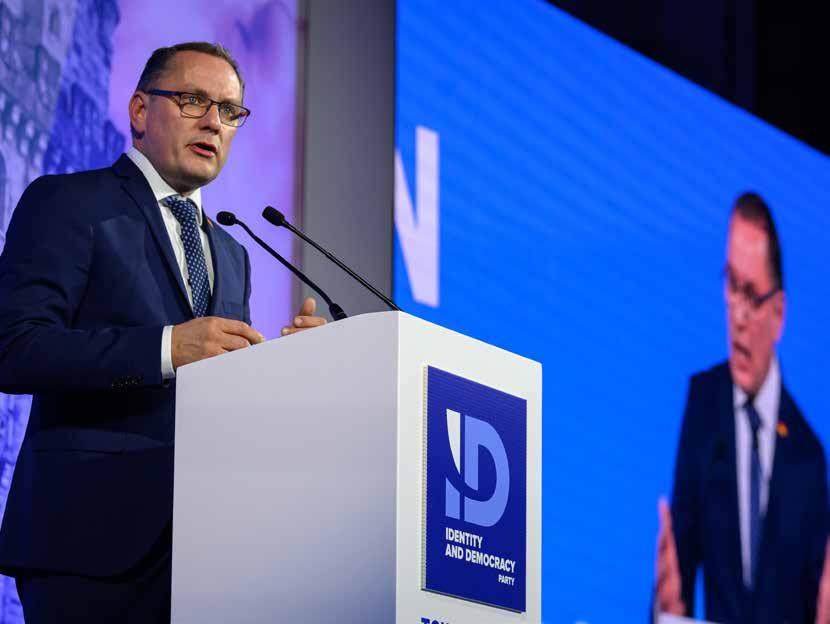
Tino Chrupalla, copresidente di Alternative für Deustchland, membro del partito ID
Tino Chrupalla, co-president of Alternative für Deustchland, member of the ID Party
Tomio Okamura, presidente dell’SPD, membro del direttivo del partito ID
Tomio Okamura, President of the SPD, member of the ID Party Bureau


In Brussels, the young people of the ID Party show that the future will be patriotic
Young European patriots met in Brussels in March 2023 to discuss their vision for the future of a Europe of patriots.
Speaking in front of 200 people not far from the European Parliament, Tom Van Grieken, President of Vlaams Belang, who was at home in the capital of Flanders, got straight to the heart of the matter by showing himself to be optimistic and combative: “I firmly believe that we are going to win the battle of ideas against cultural Marxism, gender ideologies and globalism. We have to do this for our children and our grandchildren!” Before adding, on a hopeful note: “Nothing is lost. The left is making more noise, but our numbers are increasing day by day”.
Marco Zanni of the Italian Lega group, also present in his capacity as President of the ID Group within the European Parliament, said that the chamber in
I giovani patrioti europei si sono riuniti a Bruxelles, a Marzo 2023, per discutere delle loro visioni sul futuro di un’Europa dei patrioti.
Di fronte a 200 persone, poco lontano dal Parlamento europeo, Tom Van Grieken, presidente del Vlaams Belang, giocava in casa nella capitale delle Fiandre ed è entrato subito nel vivo dell’argomento, mostrandosi ottimista e combattivo: “Sono fermamente convinto che vinceremo la battaglia delle idee contro il marxismo culturale, le ideologie legate ai generi e la globalizzazione. Lo dobbiamo ai nostri figli e ai nostri nipoti!”. Ha affermato prima di procedere con una nota di speranza: “Niente è ancora perso. La sinistra fa più rumore, ma noi siamo sempre più numerosi, giorno dopo giorno”.
Era presente, in qualità di presidente del gruppo ID al Parlamento europeo, anche l’italiano della Lega Marco Zan-

Riunione dei giovani del partito ID al Parlamento europeo
The ID Party youth meeting at the European Parliament

Gerolf Annemans, presidente del Partito ID, Vlaams Belang
Gerolf Annemans, President of the ID Party, Vlaams Belang
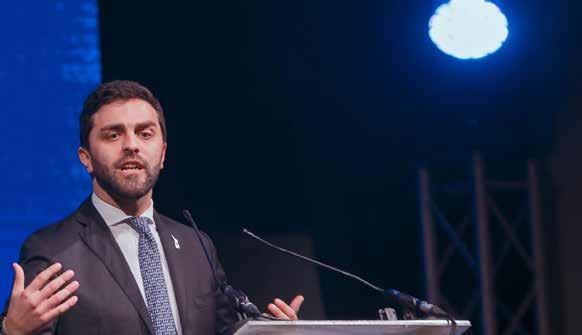
Marco Zanni, presidente del gruppo ID al Parlamento europeo, Lega, membro di ID
Marco Zanni, President of the ID Group at the European Parliament, Lega, member of the ID Party
which he sits is “the least democratic in Europe. The European Commission is the most centralising, the most dirigiste institution in the world”.
Both political leaders are already in positions of responsibility despite their young age! No doubt they will serve as a source of inspiration. The leaders of the youth sections of the ID Party members then took to the floor to speak with considerable talent.
For Filip Brusselmans, president of the Vlaams Belang youth movement, the speeches were an encouragement to join the political battle, because “there is no teaching at school that is sufficiently left-wing to stop us, because we are united and stronger than ever”. The young speakers went on to list the problems in which the European States are caught up. For Maximilian Krauss, youth leader of the Austrian FPÖ, “rather than protecting our women and children, we have assimilated the fact that men from other cultures can get away with anything without any sense of justice”. Diana Chodzajanova, a young Czech member of the SPD, returned to the subject of the dangers of inflation: “All our countries are confronted with inflation, which is making people poorer.”

Luca Toccalini, presidente della Lega Giovani, membro del partito ID
Luca Toccalini, President of the Lega Giovani, member of the ID Party
ni, il quale ha ribadito che l’emiciclo a cui siede è il “meno democratico che esista in Europa. La Commissione europea è la più centralizzatrice, la più dirigista delle istituzioni che esista al mondo”.
Ecco due responsabili politici, che si fanno carico delle loro responsabilità sin dall’età più tenera! Saranno sicuramente fonte d’ispirazione. Successivamente hanno preso la parola i leader delle sezioni giovani dei partiti i membri del gruppo ID, sempre con molto talento.
I discorsi incitavano alla lotta politica comune perché, afferma Filip Brusselmans, presidente dei giovani di Vlaams Bleang, “Non esiste alcun insegnamento a scuola che sia abbastanza di sinistra per fermarci, infatti siamo Uniti e più forti che mai”. Sempre i giovani hanno enucleato le problematiche nelle quali sono impantanati gli Stati europei. Per Maximilian Krauss, responsabile austriaco dei giovani di FPÖ, “anziché proteggere le nostre donne e i nostri bambini, abbiamo assimilato l’idea che gli uomini provenienti da altre culture possano permettersi tutto, senza alcun senso della giustizia”. Diana Chodzajanova, giovane ceca dell’SPD, ha parlato dei pericoli dell’inflazione:


Maximilian Krauss, Freiheitliche Partei Österreichs, membro del partito ID
Maximilian Krauss, Freiheitliche Partei Österreichs, member of the ID Party
Delivering a speech in praise of Homer, whose teaching is one of the foundations of European identity, Pierre-Romain Thionnet, President of the Rassemblement National youth movement, also stressed the importance of educating children: “Rather than asking what kind of world we are going to leave to our children, ecologists should be asking what kind of children we are going to leave the world to.”
Jordan Bardella, President of the Rassemblement National and member of the Identity and Democracy Party bureau, highlighted his vision of Europe: “Our vision of Europe is not frozen in the past. It looks to the future. It is looking towards aeronautics, the conquest of space, artificial intelligence, economic power and technological progress.”
The following day, the younger generation met at the European Parliament to debate the issues currently under discussion throughout the European continent.
“.“In tutti i nostri paesi, dobbiamo far fronte all’inflazione, a causa della quale le popolazioni si impoveriscono”.
Pronunciando un discorso per celebrare Omero, il cui insegnamento fa parte delle basi dell’identità europea, Pierre-Romain Thionnet, presidente dei giovani del Rassemblement National, ha inoltre insistito sull’istruzione che deve essere impartita ai bambini; “quando il cittadino ecologista si chiede quale mondo lasceremo ai nostri figli, di certo non si pone quest’altra domanda: quali figli lasceremo al nostro mondo?”.
Conferendo enfasi alla serata, Jordan Bardella, presidente Rassemblement National e membro del direttivo del partito Identità e Democrazia, ha insistito sulla sua visione dell’Europa: “La nostra visione dell’Europa non è cristallizzata nel passato. Guarda invece al futuro. Guarda all’aeronautica, alla conquista spaziale, all’intelligenza artificiale, alla potenza economica e al progresso tecnologico.
Il giorno successivo, i giovani si sono riuniti al Parlamento europeo per affrontare nel dettaglio le questioni tematiche oggetto di dibattito nella cornice del continente europeo.
In Rome, to embrace our common heritage and build for the future
Under the title “Embracing our heritage to build our future”, younger members of the Identity and Democracy Party and other European patriotic parties met in Rome in autumn 2023.
A total of no fewer than 16 nationalities were represented in the Eternal City.
In his welcome address, Matteo Salvini, President of the Lega and member of the ID Party, delivered a message of hope to the younger generation, calling on them to build a Europe based on strong cooperation and to never give up, an attitude that has enabled him to remain at the centre of the political game in Italy. Remaining steadfast at all times is a must.
After a visit to the Chamber of Deputies, the young people took part in three round-table discussions on the theme of shared identity fuelled by the complementary nature of national identities.
Con il motto “Accogliere la nostra eredità per costruire il nostro futuro”, alcuni giovani dei partiti membri del gruppo Identità e Democrazia e altri partiti patriottici si sono riuniti a Roma, nell’autunno 2023.
In tutto, erano rappresentate nella città eterna almeno 16 nazionalità.
Come benvenuto, Matteo Salvini, presidente della Lega e membro del partito ID, ha pronunciato un messaggio pieno di speranza per i giovani, chiamandoli a costruire un’Europa basata su una collaborazione forte e a non arrendersi mai, atteggiamento che gli ha consentito di restare al centro dei giochi politici in Italia. La costanza, sempre la costanza.
Dopo una visita alla Camera dei Deputati, i giovani hanno avviato tre tavole rotonde in merito all’identità comune, nutrita dalla complementarità delle identità nazionali.
Lo scopo della prima sessione era de-
Filip Brusselmans, presidente di Vlaams Belang Jongeren, membro del partito ID
Filip Brusselmans, President of Vlaams Belang Jongeren, member of the ID Party

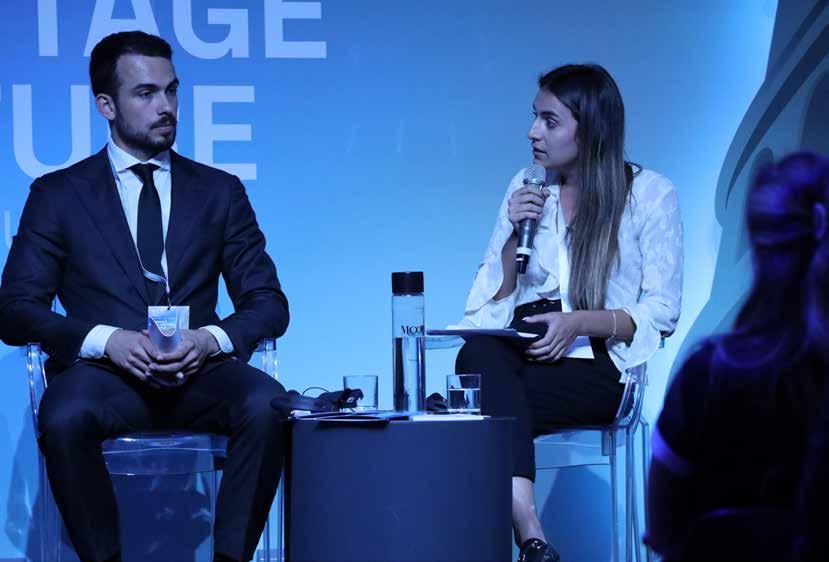
Pierre-Romain Thionnet, Rassemblement National, e
Rita Maria Matias, Chega!, membri del partito ID
Pierre-Romain Thionnet, Rassemblement National (RN), and Rita Maria Matias, Chega, members of the ID Party


I giovani del partito ID di fronte al Parlamento della Repubblica italiana
ID Party Youth in front of the Parliament of the Italian Republic
The first panel focused on understanding the notion of Europe as a civilisation. According to Pierre-Romain Thionnet, President of the Rassemblement National de la Jeunesse, “Europe did not come into being in 1992, it did not begin with the treaty signed in Rome in 1957, nor was it born with Jean Monnet or Robert Schuman. Europe originated in Greece.”
And now more than ever, that identity is under threat as a result of wokery and cancel culture in particular. “Communism didn’t fall after the Soviet Union, and it has continued to develop. Traditional family values are seen as an enemy by the left, as are the individual histories of each country,” said Rita Maria Matias, President of the Chega youth movement.
The second roundtable discussion was specifically devoted to the dangers we will have to contend with. These inevitably included immigration. For Filip Brusselmans, leader of the Vlaams Belang Jongeren, “Flanders’ values are threatened by the migratory invasion. Europe is the key to dealing with this influx of people: let’s work together to build solid borders”.
The theme discussed by the third panel concerned the various challenges that young patriots will have to deal with in coming years, and environmental and energy issues in particular. Selon Eino Rantanen, president de Blue Awakening, section jeune du parti estonien EKRE, “the real green commitment lies in the programmes and in the spirit of the centre-right forces. We must do something useful
finire la nozione di Europa in termini culturali. Secondo Pierre-Romain Thionnet, presidente del Rassemblement National giovani, “L’Europa non è nata nel 1992, non è nata con il trattato firmato a Roma nel 1957 e non è nata con Jean Monnet o Robert Schuman. L’Europa è nata in Grecia.”
E questa identità oggi è sempre più minacciata dal wokismo e dalla cancel culture in particolare. “Il comunismo non è caduto dopo l’Unione sovietica, ma ha invece continuato a svilupparsi. I valori della famiglia tradizionale sono un nemico per la sinistra, proprio come le storie singole di ogni paese”, ha precisato Rita Maria Matias, presidente dei giovani di Chega.
E la seconda tavola rotonda è stata dedicata proprio ai pericoli che dovremmo affrontare. Fra questi figura inevitabilmente l’immigrazione. Per Filip Brusselmans, leader des Vlaams Belang Jongeren, “i valori delle Fiandre sono messi in pericolo dall’invasione migratoria. Per fare fronte a questo afflusso di persone, l’Europa è necessaria: lavoriamo insieme per costruire frontiere solide”.
Il tema della terza sessione riguardava le varie poste in gioco per gli anni a venire e le sfide che si presenteranno ai giovani patrioti, in particolare le questioni ambientali ed energetiche. Secondo Eino Rantanen, presidente dei giovani del partito estone EKRE, “l’impegno vero risiede nei programmi e nello spirito delle forze del centrodestra. Dobbiamo fare qualcosa di utile per le generazioni future, ma ragionevolmente, per esempio investire nel
for future generations, but we must act wisely, such as investing in nuclear power, a clean source of energy that will increase the independence of each country’s energy supply.”
In his closing remarks, Chega President André Ventura reminded us of the importance of defending our identity. “We who are committed to defending our civilisation are the true Europeans, not the Marxists who spread left-wing propaganda in schools and universities. Tell everyone that the right-wing is the future and that we will win!”
nucleare, una fonte di energia pulita che rinforzerà l’indipendenza energetica di ogni Stato”.
In conclusione, il presidente di Chega, Andrea Ventura, ha ricordato ancora una volta l’importanza di difendere la nostra identità. “Noi, che ci impegniamo a difendere la nostra cultura, siamo i veri europei, non lo sono di certo i marxisti che diffondono una propaganda di sinistra nelle scuole e nelle università. Dite a tutto il mondo che la destra è il futuro e che vinceremo!
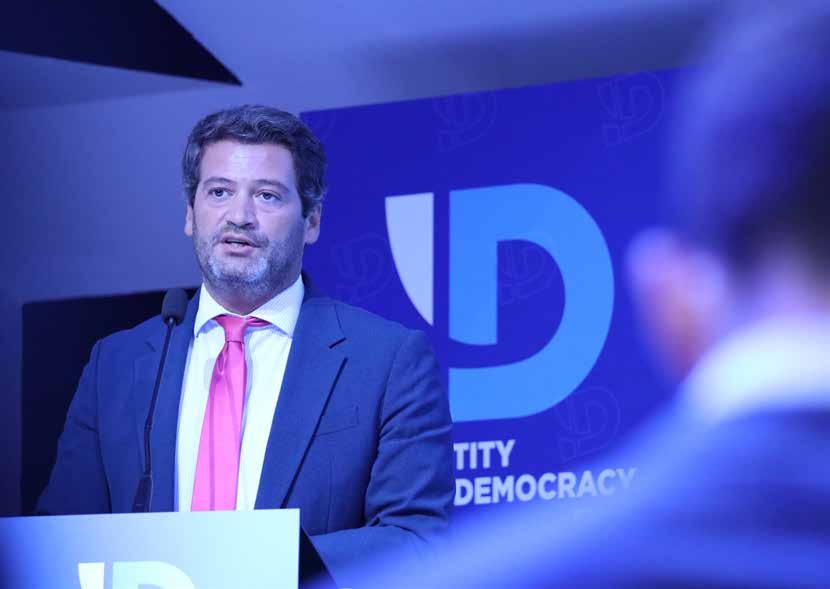
André Ventura, presidente di Chega!, membro del partito ID
André Ventura, President of Chega, member of the ID Party
A look back at a term of office marked by meetings, events and conferences
2022 meeting in Antwerp : “Our Europe”
“We have opted for Enlightenment; we are for security, for sovereignty and for freedom; we embrace our JudeoChristian civilisation” (Geert Wilders)
“The EU, like the USSR, is a travesty of democracy. The will of the people is never entirely respected by the ruling class” (Martin Helme)
“Noi scegliamo la i valori illuministi; noi siamo per la sicurezza, per la sovranità, per la libertà; noi optiamo per la nostra cultura giudaico - cristiana” (Geert Wilders)
“Nell’UE, come nell’URSS, c’è solo la parvenza della democrazia. La volontà del popolo non è mai davvero rispettata dalla classe dirigente” (Martin Helme)

Tom Van Grieken, presidente del Vlaams Belang, membro del partito ID
Tom Van Grieken, president of Vlaams Belang, member of the ID Party


Judit Varga, ministro ungherese della Giustizia (2019-2023)
Judit Varga, Hungarian Minister of Justice (2019-2023)

Harald Vilimsky, Geert Wilders e Martin Helme
Harald Vilimsky, Geert Wilders and Martin Helme
“The EU has changed since the first treaties and adopted a totalitarian style, as illustrated by its attitude towards Hungary, which is now spearheading resistance. This abuse of power reaches far and wide seeing as the EU has no qualms about working to change people’s mindsets in order to impose its ideology” (Jean Paul Garraud)
L’UE si è evoluta dai tempi dei primi trattati e ha adottato uno stile totalitario, lo dimostra il suo atteggiamento nei confronti dell’Ungheria, oggi punta di diamante della resistenza. Questo abuso di potere si fa strada, perché l’UE non esita ad adoperarsi per manipolare le mentalità dei cittadini, al fine di imporre la propria ideologia” (Jean Paul Garraud)

Jean-Paul Garraud, capo della delegazione francese del gruppo ID al Parlamento europeo
Jean-Paul Garraud, leader of the French delegation of the ID group at the European Parliament
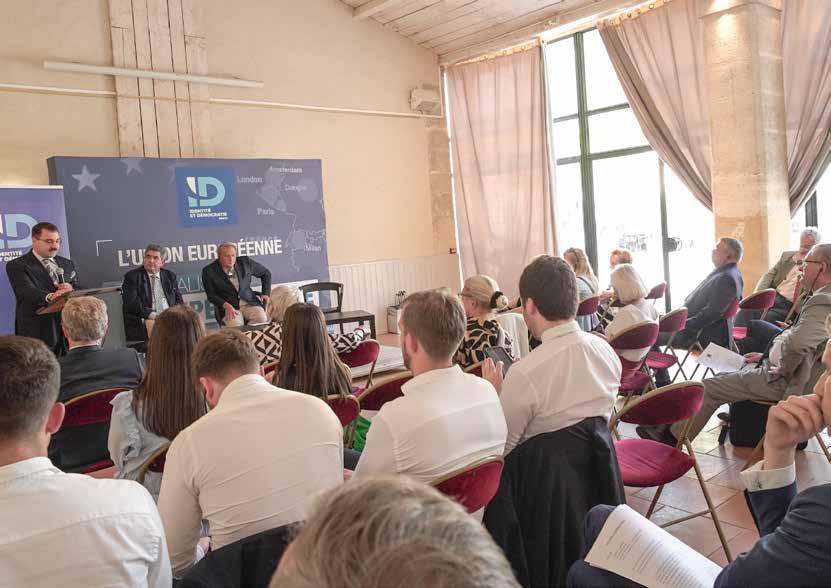

Philippe Olivier, membro del Parlamento europeo, membro del partito ID
Philippe Olivier, Member of the European Parliament, member of the ID Party
“Through their lack of action and needless chatter, Europe’s leaders are directly responsible for the industrial evisceration of the continent, which will lead to the economic collapse of our countries and the social decline of our peoples” (Jordan Bardella)
“Con la loro inerzia e le loro chiacchiere inutili, i dirigenti europei sono i diretti responsabili dell’eviscerazione industriale che colpisce il continente e che provocherà lo stallo economico dei nostri paesi, nonché il declassamento sociale dei popoli”. (Jordan Bardella)
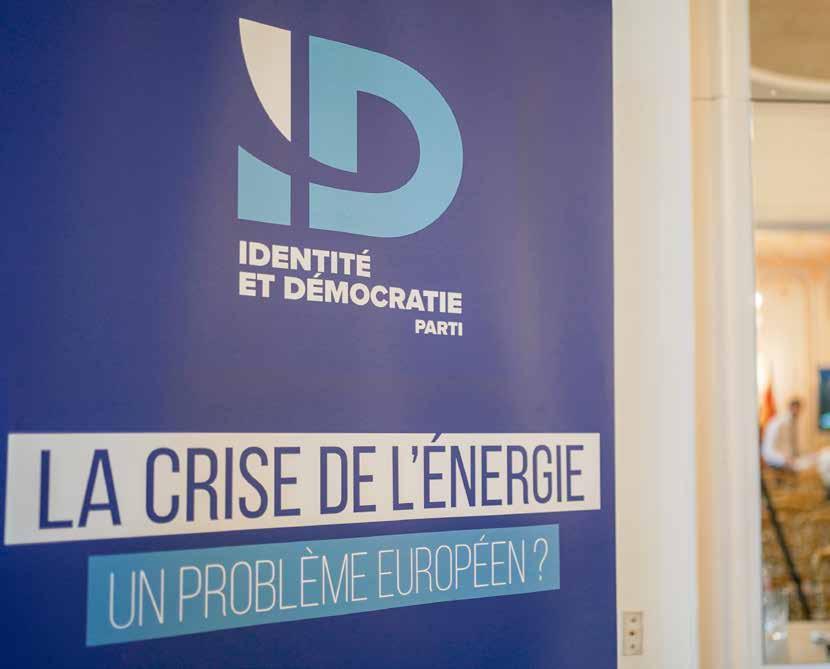

Jordan Bardella, presidente del Rassemblement National, membro del direttivo del partito ID
Jordan Bardella, President of the Rassemblement National, member of the ID Party bureau

Mathilde Androuët, membro del Parlamento europeo, presidente della Fondazione ID
Mathilde Androuët, Member of the European Parliament, President of the ID Foundation


The political scene has changed radically in recent years. Whereas patriotic parties were in the opposition, more and more of them are now making their presence felt in government, on the strength of their electoral results; elsewhere, as in France, they are on the threshold of power, with the presidential elections of 2027 in mind; and finally, in some countries, young parties are rapidly imposing themselves within the political arena.
Let’s start with the countries where patriotic political forces have long been part of the political landscape and are (or have been) in power.
In Italy, after the early resignation of the Draghi government, whose various parties had failed to reach an agreement, Italians sent a clear message by voting in favour of the right-wing parties. The government presented a month later included Fratelli d’Italia, the Lega (a member of the ID Party) and Forza Italia. Matteo Salvini, a leading figure in the Lega, is now Deputy Prime Minister of Italy and Minister for Infrastructure and Sustainable Mobility.
La mappa politica è cambiata profondamente negli ultimi anni. Se prima, nella maggior parte dei paesi, stavano all’opposizione nascosti dietro un cordone sanitario, oggi sanno imporsi sempre maggiormente nei governi, forti dei risultati ottenuti alle elezioni; altrove come in Francia, sono alle soglie del potere, in vista anche delle elezioni presidenziali del 2027; infine, in alcuni paesi, esistono giovani partiti capaci di imporsi a gran velocità nel gioco politico.
Iniziamo la nostra panoramica con uno sguardo ai paesi in cui le forze politiche patriote sono, da molto tempo, insediate nel paesaggio politico e partecipano (o hanno partecipato) al potere.
In Italia, dopo le dimissioni anticipate del governo Draghi, i cui diversi partiti non erano riusciti a trovare un accordo, gli italiani hanno espresso un messaggio chiaro, plebiscitando i partiti di destra. Il governo presentato un mese più tardi associa Fratelli d’Italia, la Lega (membro del partito ID) e Forza Italia. Esponente di spicco
Tino Chrupalla e Tomio Okamura
Tino Chrupalla and Tomio Okamura
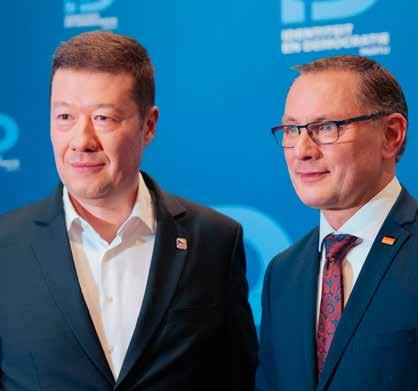
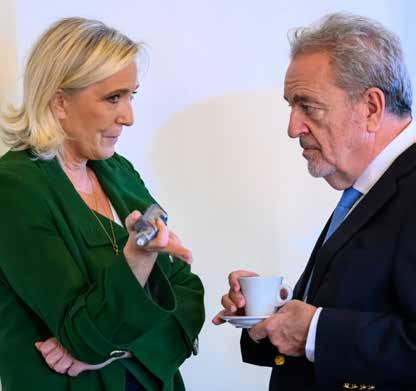
Marine Le Pen e Gerolf Annemans
Marine Le Pen and Gerolf Annemans
In Austria, Freiheitliche Partei Österreichs (a member of the ID Party) is considering a return to power, not as a minor partner in a coalition, but as its driving force. The polls show that the party currently led by Herbert Kickl boasts 30% of voting intentions, compared with 23% for the ÖVP and 20% for the SPÖ. Far behind, the Greens have dropped to 9%, ahead of the NEOS liberals with 8% and the far-left KPÖ, which has made a spectacular leap to 7%. The FPÖ had already been in power in the 1980s, but also more recently between 2000 and 2005, and again between 2017 and 2019.
The latest regional elections confirmed the trend. In Lower Austria, in Land Niederösterreich, the largest of the country’s federal States and the second most densely populated, the FPÖ made spectacular progress, obtaining almost 24% of the votes, that is 9 points more than in the previous elections. In Land Carinthia, the party maintained its position at 25%, far behind the SPÖ, but with a very respectable result, without making the same breakthrough as in Lower Austria. In the state of Salzburg, the last regional
della Lega, Matteo Salvini è oggi Vicepresidente del Consiglio dei ministri e Ministro delle Infrastrutture e dei Trasporti.
In Austria, la Freiheitliche Partei Österreichs (membro del partito ID) prevede un ritorno al potere, non come partner minore ma come motore pulsante della coalizione. I sondaggi indicano che il partito attualmente diretto da Herbert Kickl è accreditato dal 30 % delle intenzioni di voto, contro il 23 % per ÖVP e 20 % per SPÖ. Molto più indietro, i verdi cadono al 9%, davanti ai liberali di NEOS (8%) e alla formazione di estrema sinistra KPÖ, che compie un balzo spettacolare al 7%. L’FPÖ aveva già preso parte al potere negli anni ‘80, ma anche più recentemente, fra il 2000 e 2005, e poi fra il 2017 e 2019.
Le ultime elezioni regionali hanno confermato la tendenza. Lo scrutinio in bassa Austria, nel Land del Niederösterreich, il più esteso degli stati federali del paese e il secondo per popolazione, ha fatto riportare uno spettacolare avanzamento dell’FPÖ, con il 24% dei voti, ovvero 9 punti in più
election to date, the FPÖ, led by Marlene Svazek, gained 6 points to secure almost 26% of the vote, coming in behind the ÖVP, which was in freefall (30%, down 7 points).
The right-wing was the clear winner in the Swedish parliamentary elections held on the 11th September 2022, with the Sverigedemokraterna (Sweden Democrats) becoming the country’s second largest party with 20.5% of the vote. Although the Social Democrats have remained the leading political force, with a score in excess of 30%, the right-wing bloc (SD, Moderates, Christian Democrats and Liberals) obtained almost 50% of the vote, ahead of the left-wing bloc (Social Democrats, Left, Greens and Centre Party), thus allowing it to seize power.
Following the legislative elections in Slovakia in 2023, the new government now consists not only of the Prime Minister’s SMER - sociálna demokracia party, but also of the new member of the Identity and Democracy Party, Slovenská národná strana. The latter obtained 10% of the vote, a score that has risen sharply.
Obviously, we cannot ignore the situations in Hungary and Poland. Nothing seems to rattle Fidesz, which has been in power for 14 years and has been systematically re-elected by voters who are clearly unwilling to see their countries transformed by mass immigration and its repercussions. In Poland, the PiS governed for 9 years before being forced into the opposition as a result of the last elections.
rispetto alle elezioni precedenti. Nel land della Carinzia, il partito si è mantenuto al 25%, piuttosto alle spalle delle SPÖ, ma con un risultato molto soddisfacente, pur senza fare breccia come in Bassa Austria. Nello stato di Salisburgo, alle ultime elezioni regionali in ordine di tempo, l’FPÖ, guidato da Marlene Svazek è salito di 6 punti, portandosi al 26% circa dei voti, ovvero alle calcagna dell’ÖVP in caduta libera (30%. -7 punti).
La destra è stata la massima vincitrice allo scrutinio legislativo tenutosi in Svezia l’11 settembre 2022, segnato dall’avanzamento degli Sverigedemokraterna (Democratici di Svezia), che si sono aggiudicati il secondo posto fra i partiti del paese con il 20,5% dei voti. Seppure i socialdemocratici siano sempre la prima forza politica, con un punteggio superiore al 30%, il blocco di destra (SD, Moderati, cristiano-democratici e liberali) ha ottenuto oltre il 50% dei voti, superando il blocco di sinistra (socialdemocratici, partito di Sinistra, Verdi e partito del Centro) e procurandosi l’accesso al potere.
In Slovacchia, il governo realizzato nel 2023 in seguito alle elezioni legislative, comprende, oltre al partito SMER – sociálna demokracia del Primo ministro, anche il nuovo membro del partito Identità e Democrazia, ovvero Slovenská národná strana. Quest’ultima ha ottenuto il 10% dei voti, un punteggio in forte rialzo.
Non si può certo sorvolare sulle situazioni dell’Ungheria e della Polonia. Niente sembra scalfire il Fidesz, al po-

Elsewhere, patriotic parties have never been so close to seizing power.
In France, after winning 42% of the vote in the presidential election, Marine Le Pen has succeeded in her bid to become the main opposition force in the National Assembly: the RN now has 88 MEPs, whose conscientious work is now recognised, even among political adversaries. The polls show that the party is making steady progress in terms of voting intentions, and its main leaders are very well regarded, Marine Le Pen and Jordan Bardella being the second and third most popular political figures.
A little further north, in Flanders, Vlaams Belang, led by Tom Van Grieken, is in the lead in terms of voting intentions, with 28% according to the latest polls, ahead of the N-VA, with whom it hopes to form a government. It remains to be seen whether the latter party is in favour of a “Flemish coalition” that would result in the independence of Flanders, or an alliance with the Walloon socialists.
Finally, there are the emerging political forces: in less than five years of existence Chega in Portugal for instance has become the country’s third largest political force. With the toppling of the Portuguese government in November 2023 and the new elections, the party made further progress and obtained 18% of the votes in March 2024.
tere da 14 anni esiste tematicamente rivotato dagli elettori, che di sicuro non intendono vedere i loro paesi trasformati dall’immigrazione di massa con le relative conseguenze. In Polonia il PiS ha governato per 9 anni, prima di ritrovarsi all’opposizione dopo le ultime elezioni.
Peraltro i partiti patrioti non sono mai stati così vicini a conquistare il potere.
In Francia, dopo aver ottenuto il 42 % dei voti alle elezioni presidenziali, Marine Le Pen è riuscita nella sua impresa di diventare la maggiore forza d’opposizione all’Assemblea nazionale: l’RN conta oggi ben 88 deputati, che lavorano con estrema serietà, come riconosciuto anche per gli avversari politici. Secondo i sondaggi, il partito continua a crescere nelle intenzioni di voto e i suoi principali dirigenti sono apprezzati da tutti: Marine Le Pen e Jordan Bardella sono la seconda e la terza personalità politiche più amate.
Poco più a nord, nelle Fiandre il Vlaams Belang, condotto da Tom Van Grieken, domina le intenzioni di voto con il 28% secondo gli ultimi sondaggi, davanti alla N-VA, con cui spera di entrare al governo: non si sa ancora se quest’ultimo partito desideri una “coalizione fiamminga” volta a ottenere l’indipendenza delle Fiandre oppure allearsi con i socialisti valloni.
Ricordiamo infine le forze politiche emergenti, come Chega in Portogallo che, in meno di cinque anni di esistenza, ha saputo diventare la terza forza politica del paese. Con la caduta del governo portoghese nel novembre

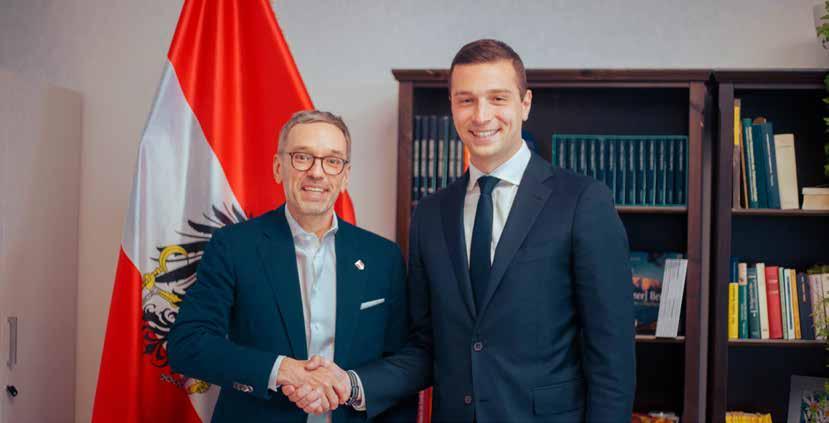
Herbert Kickl e Jordan Bardella
Herbert Kickl and Jordan Bardella
2023 e le nuove elezioni, il partito ha proseguito la sua avanzata e ha ottenuto il 18% dei voti a marzo 2024.
Geert
There was a thunderbolt in the Netherlands on the 23rd of November when the Partij voor de Vrijheid (member of the ID Party) became the country’s leading political force, far ahead of its main rivals. With 23.49% of the vote and 37 MEPs, it has overtaken both the socialists of GroenLinks-PvdA (15.75%, 25 elected representatives) and the VVD (15.24%, 24 seats). After years of the Netherlands being bogged down by Mark Rutte’s policies, this change of direction promises a new political agenda
Geert Wilders, President of the PVV, has thus been rewarded for his determination: at the head of the party he founded since 2006, this former MP from the Volkspartij voor Vrijheid en Democratie (VVD), which he later shunned, is forever hammering home its message against mass immigration and its inevitable corollary, the Islamisation of his country.
In an exclusive interview with Eidos in 2022, he said: “Mass immigration has transformed the Netherlands beyond
Grande scossone nei Paesi Bassi il 23 novembre scorso: il Partij voor de Vrijheid (membro del partito ID) è diventato proprio in quel momento la prima forza politica del paese, con ampio distacco dai suoi principali concorrenti: con il 23,49% dei voti e 37 deputati, supera i socialisti di GroenLinks-PvdA (15,75%, 25 eletti) e il VVD (15,24%, 24 seggi). Impantanati per anni nella politica di Mark Rutte, i Paesi Bassi accolgono un cambiamento di rotta che promette una politica nuova.
Geert Wilders, presidente del PVV riceve quindi la ricompensa per la sua costanza: dal 2006 a capo del partito che egli stesso ha fondato, questo ex-deputato del Volkspartij voor Vrijheid en Democratie (VVD), al quale ha voltato le spalle, continua a ripetere senza mai stancarsi il suo messaggio contro l’immigrazione di massa e il relativo corollario, l’islamizzazione del suo paese.
In un’intervista esclusiva concessa a Eidos nel 2022, dichiarava quanto segue: “L’immigrazione di massa ha trasformato i Paesi Bassi al punto tale da
Geert Wilders con Tom Van Grieken e Marine Le Pen alla riunione
Geert Wilders with Tom Van Grieken and Marine Le Pen at the ID Party leaders’ meeting in Brussels

all recognition over the last few decades. Large parts of our cities look more like Ankara, Rabat or Riyadh than Dutch towns (...) Many Dutch people already feel like strangers in their own streets, neighbourhoods, villages and towns. I want us to be able to retrieve our own immigration policy, so that the Royal Military Police can once again monitor our borders and prevent asylum seekers from entering our country.”
In a country that once held sway over Europe during the Golden Age, the demographic transformation underway is causing concern among a growing number of Dutch people, who are also feeling the full force of other problems that are impacting their daily lives, namely their purchasing power. Farmers have been particularly affected too, as environmental measures have meant reducing their livestock numbers.
With Geert Wilders, the Netherlands find the path to common sense, which was so often abandoned.
renderli irriconoscibili nel corso degli ultimi decenni. Ampie zone delle nostre città somigliano più ad Ankara, Rabat oh Riyad che ha una città olandese (...) Molti olandesi si sentono già stranieri per le loro strade, nei loro quartieri, nei loro paesi e città. Io voglio che ritorniamo ad avere la nostra politica di migrazione, che la polizia militare reale possa nuovamente sorvegliare i nostri confini, impedendo l’ingresso ai richiedenti asilo.”
In un paese che splendeva sull’Europa, ai tempi del Secolo d’oro, la trasformazione demografica in corso preoccupa sempre più gli olandesi, che subiscono più o meno gli stessi colpi di frusta degli altri ma con un impatto sulla vita di tutti i giorni, in particolare per quanto concerne il potere d’acquisto. Sono stati particolarmente esposti soprattutto gli agricoltori, in quanto le misure ambientali prevedono la riduzione dei loro allevamenti.
Con Geert Wilders, i Paesi Bassi e coloro che sostengono la vita quotidiana del paese ritrovano la via del buon senso, così spesso abbandonata.
Svoboda a přímá demokracie -
President: Tomio Okamura
Rassemblement
President: Jordan Bardella
of the National Parliament
Co-leaders: Tino Chrupalla and Alice Weidel
Slovenská národná strana
President: Andrej Danko
23 Members of the European Parliament
66 Members of the National Parliament
30 Senators
6 Regional presidents
201 Regional councillors
Federal Secretary: Matteo Salvini Chega
50 Members of the National Parliament
9 Regional elected representatives
President: André Ventura
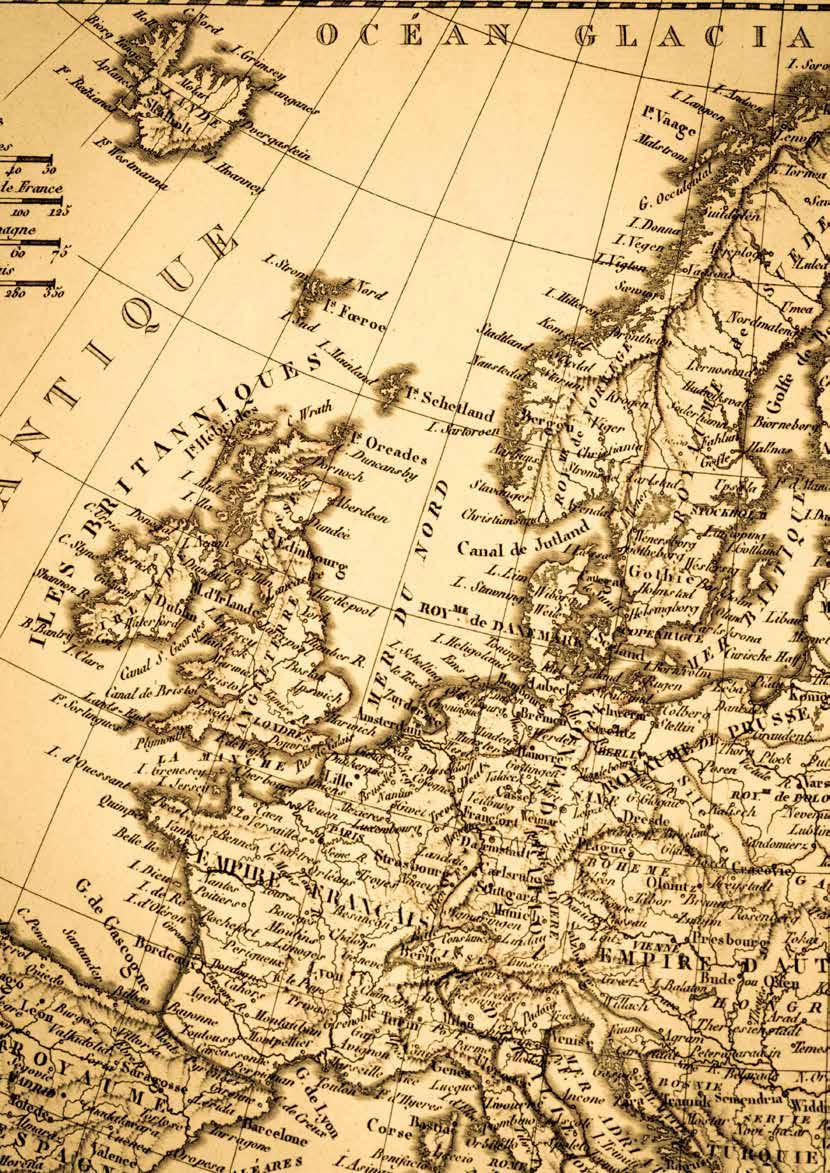
Gregory Vanden Bruel
The French poet Paul Valéry famously stated: “I call European any land that has been successively Romanised, Christianised and subjected to the disciplines and spirit of the Greeks.” Need we say more when seeking to define European civilisation? To be fair, we could add that a century later, these same lands were also secularised in the wake of the Enlightenment, the legacy of which, like a snake biting its own tail, is reflected today in destructive individualism.
At the root of European civilisation, which has so little to do with that of European technocrats, are the works of Homer, which should be read by everyone, for their ferocious beauty and the lessons they teach us. While individual destinies are inevitably influenced by deities who intervene in human lives, and even go so far as to plead the cases of their protégés (Aphrodite supporting Paris, who had elevated her to the rank of the fairest of all goddesses, Ares siding with the Trojans, Athena and Hermes
Il poeta francese Paul Valéry si esprimeva in questo modo: “Definisco europeo tutto il territorio che è stato successivamente romanizzato, cristianizzato e sottomesso alle discipline e allo spirito dei Greci”. Servono altre definizioni per il territorio culturale europeo? Eventualmente, con un intervallo di un secolo, potremmo aggiungere che questi stessi territori furono anche laicizzati sull’onda dell’Illuminismo, il cui patrimonio, come un serpente che si morde la coda, si traduce oggi nell’individualismo distruttore dei punti di riferimento.
Alla base della cultura europea, che così poco ha a che vedere con i tecnocrati europei, l’opera di Omero deve essere resa nota a tutti, per la sua bellezza feroce e per gli insegnamenti che ci offre. Se i destini individuali sono giocoforza influenzati dalle divinità che si incarnano tanto da scendere in campo al loro fianco (Afrodite sostiene Paride, che l’aveva proclamata dea più bella fra le dee; Ares si schiera con i troiani, Atena ed Ermes aiu-
helping Ulysses, etc.), the heroes remain free and sovereign throughout the 27,000 verses of “The Iliad” and “The Odyssey”. Better still, they live in harmony with nature and the elements (no need for a Green Deal) and remain deeply rooted. In “The Iliad” and the conflict between the Achaeans and the Trojans (different times and different customs) people fought for and with their own, and subsequently died with them, while in “The Odyssey”, Ulysses yearns to return to his roots after an absence of nineteen years on the island of Ithaca, despite the promise of being able to enjoy heaven on earth. Symbolically, Ulysses sings “I find nothing sweeter than my homeland and my parents, not even if I inhabited an opulent home, but in a strange country far from them”.
The first to make the transition were the Greeks, whose genius lay in their philosophers, both pre-Socratic and Socratic (“know thyself”), in the democracy that was born under Clisthenes and brought to its peak (albeit imperfectly, seeing as only 10% of the electorate were allowed to vote at the time, but is the people’s voice heard any more clearly today?) by Pericles, by Aristotle’s own critique of politics, by the development of knowledge and the sciences (astronomy, mathematics, physics), and by a certain sense of aesthetics that made beauty the supreme value, particularly in the case of Praxiteles, referred to by Varro in the following words: “any man who has even the slightest bit of culture is familiar with his works because of his excellent talent”.
tano Ulisse), gli eroi restano liberi e sovrani per tutti i 27.000 versi dell’iliade e dell’odissea. Per meglio dire, vivono in armonia con la natura e gli elementi (anche senza Green Deal) e lodano le proprie radici. Nell’Iliade e nel conflitto fra atei e troiani, altri tempi e altri costumi, ci si batte per la propria gente con la propria gente e con questa gente si muore, mentre nell’Odissea, Ulisse vuole far ritorno a Itaca, ovvero alle proprie origini, dopo un’assenza di diciannove anni, nonostante la promessa del paradiso terrestre. Emblematicamente, Ulisse dice che “è proprio vero che non vi è niente di più dolce della patria e dei genitori, anche se il territorio in cui si abita è ricco, ma lontano da loro è in terra straniera”.
I primi che garantirono la transizione furono i Greci, il cui genio fu quello dei filosofi presocratici, socratici (“conosci te stesso”), della democrazia nascente sotto Clistene e portata al suo apice, seppur in maniera imperfetta (solo il 10 % dell’elettorato godeva a quel tempo del diritto di voto... ma poi, davvero oggi il popolo è più ascoltato?) da Pericle, della critica stessa di Aristotele alla politica, dello sviluppo del sapere e delle scienze (astronomia, matematica, fisica) di una certa estetica secondo cui la bellezza è un valore supremo, in particolare per Prassitele, a proposito del quale Varrone scrisse: “Grazie all’eccellenza del suo talento, è conosciuto da chiunque abbia anche solo un minimo di cultura.”
Lo spirito romano si incarnava nella realtà e nell’essenza concreta dei prin-
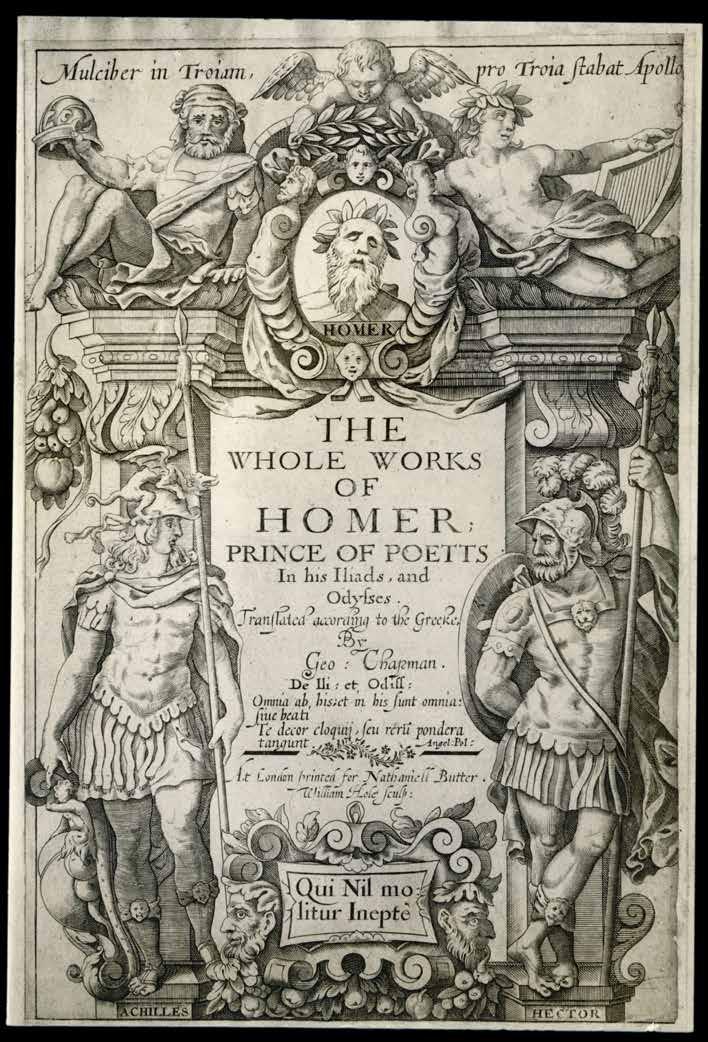
The Roman mindset meant that principles that had hitherto remained too abstract were translated into concrete terms, that the spirit of the city evolved into that of an allpowerful empire, that the labyrinthine web was transformed into an orderly grid network of roads, bridges and aqueducts that allowed trade to flourish. Roman emperors, bloody though they were, were first and foremost men, and no longer god-like heroes; their armies were manned by professionals instead of mercenaries. Codified law replaced arbitrary law, and paved the way for the rule of law (compared to the present day “coup” by judges).
Beginning with Constantine’s conversion in 312, Catholicism shaped the West for fifteen centuries, which is no mean feat, offering a common spirituality and dotting the landscape with a dense tapestry of churches and lofty cathedrals that rose skywards, all of which has taught us what we would now modestly call lessons in life: by driving the merchants out of the temple, an episode magnificently reproduced by El Greco, Jesus taught us to transcend the notion of utilitarianism; in the parables of the lost sheep and the prodigal son, we learn not to reject those who have lost their way; by dying on the cross, Christ bequeathed to us the most valuable lesson of all, that of sacrifice. We are all familiar with Chesterton’s observation that says that “The virtues have gone mad because they have been isolated from each other and are wandering alone.” We cannot, therefore, reduce a religion to isolated acts or lessons,
cipi, che fino allora erano stati troppo astratti, nel passaggio dalla dimensione di città a quella di un potentissimo impero, dai dedali di strade alla ripartizione in quartieri, con tanto di lastricature, ponti e acquedotti, che consentirono lo sviluppo del commercio. Gli imperatori romani, per quanto potessero essere cruenti, furono soprattutto uomini, non più eroi divinizzati; i loro eserciti, composti da professionisti, sostituirono i mercenari. Il diritto codificato sostituì l’arbitrarietà e tracciò il percorso che avrebbe condotto verso lo stato di diritto (prima della recente “rivoluzione dei giudici”).
Dopo la conversione di Costantino nel 312, il cattolicesimo ha strutturato l’Occidente per quindici secoli, e non è una bazzecola, offrendo una spiritualità comune, ha impreziosito i paesaggi con un tappeto di chiese infiorato di cattedrali che parlavano ai cieli e ci ha impartito ciò che oggi, pudicamente, chiameremmo lezioni di vita: cacciando i mercanti dal tempio, episodio magnificamente raffigurato da El Greco, Gesù ci ha insegnato a superare l’utilitarismo; dalle parabole della pecorella smarrita e del figliol prodigo, impariamo a non escludere chi si perde per strada; morendo sulla croce, Cristo ci lascia la lezione più bella, quella del sacrificio. Tutti conosciamo l’aforisma di Chesterton: “Le virtù sono impazzite perché sono state isolate l’una dall’altra e stanno vagando sole”. Non è pertanto possibile riassumere una religione in atti o lezioni isolati, ma dobbiamo concepirla come il più bello degli affreschi, senza cui certi principi profondamen-
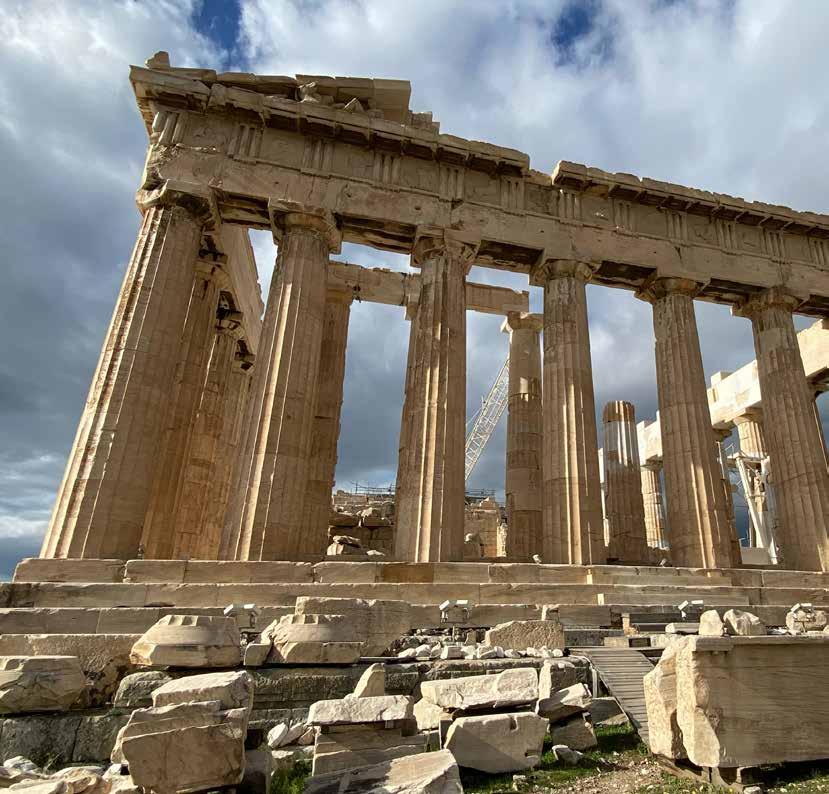
but we must conceive of it as the loveliest of historical epics, without which profoundly human principles would go astray and turn against us. And so it is with charity, which has become a compulsory form of solidarity, the welcoming of every worldly misery, our own self-effacement being the result of our constant willingness to turn the other cheek.
te umani perderebbero la rotta e si ritorcerebbero contro di noi. Lo stesso dicasi della carità, che è diventata solidarietà obbligatoria, accoglienza di tutti gli indigenti del mondo, nonché nostra stessa decadenza per eccesso nel porgere l’altra guancia.
IDENTITÀ E DEMOCRAZIA PARTITO
Rivista pubblicata dal Partito Identità e Democrazia
Identité et Démocratie Parti
75 Boulevard Haussmann - 75008 Paris - France contact@id-party.eu
Presidente del Partito Identità e Democrazia: Gerolf Annemans Direttore della pubblicazione: Gregory Vanden Bruel
Il partito ID è finanziato in parte dal Parlamento europeo ed è l’unico responsabile di questa pubblicazione.
Questa pubblicazione non è destinata alla vendita.
IDENTITÀ E DEMOCRAZIA PARTITO www.id-party.eu facebook.com/IDParty/ twitter.com/IDParty_
instagram.com/idparty_/
IDENTITÀ E DEMOCRAZIA
PARTITO
Il partito ID è finanziato in parte dal Parlamento europeo ed è l’unico responsabile di questo contenuto.
Eidos è la rivista del Partito Identità e Democrazia